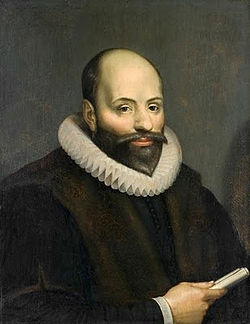„āĘ„Éę„Éü„Éč„ā¶„āĻšłĽÁĺ©
 „āĘ„Éę„Éü„Éč„ā¶„āĻšłĽÁĺ©Ôľą„āĘ„Éę„Éü„Éč„ā¶„āĻ„Āó„āÖ„ĀéԾȄĀĮ17šłĖÁīÄŚąĚť†≠„ĀęŚßč„Āĺ„Ā£„Āü„Éó„É≠„ÉÜ„āĻ„āŅ„É≥„ÉąťĀčŚčē„Āß„Āā„āä„ÄĀ„ā™„É©„É≥„ÉÄśĒĻťĚ©śīĺÁ•ěŚ≠¶ŤÄքɧ„ā≥„ÉĖ„āĻ„ÉĽ„āĘ„Éę„Éü„Éč„ā¶„āĻ„Ā®„ÄĀ„ɨ„ÉĘ„É≥„āĻ„Éą„É©„É≥„Éąśīĺ„Ā®„Āó„Ā¶Áü•„āČ„āĆ„āčŚĹľ„Āģś≠īŚŹ≤ÁöĄśĒĮśĆĀŤÄÖ„ĀģÁ•ěŚ≠¶ÁöĄŤÄÉ„Āą„ĀęŚüļ„Ā•„ĀĄ„Ā¶„ĀĄ„āč„Äā„ā™„É©„É≥„ÉÄ„Āģ„āĘ„Éę„Éü„Éč„ā¶„āĻšłĽÁĺ©„ĀĮ„ÄĀ„Éć„Éľ„Éá„Éę„É©„É≥„ÉČťÄ£ťā¶ŚÖĪŚíĆŚõĹ„Ā꜏źŚáļ„Āē„āĆ„ĀüÁ•ěŚ≠¶Ś£įśėé„Āß„Āā„āč„ÄƄɨ„ÉĘ„É≥„āĻ„Éą„É©„É≥„āĻ„ÄćÔľą1610ŚĻīԾȄĀßśúÄŚąĚ„Āꍰ®śėé„Āē„āĆ„Āü„Äā„Āď„āĆ„ĀĮ„ÄĀšļąŚģöŤ™¨„ĀģŤß£ťáą„ĀęťĖĘťÄ£„Āô„āč„āę„Éę„Éī„ā°„É≥šłĽÁĺ©„ĀģśēôÁĺ©„āíŚíĆ„āČ„Āí„ā荩¶„ĀŅ„ā퍰®ÁŹĺ„Āó„Āü„āā„Āģ„Āß„Āā„Ā£„Āü„Äā „āĘ„Éę„Éü„Éč„ā¶„āĻ„ĀĆšłĽ„Ā™Ť≤ĘÁĆģŤÄÖ„Āß„Āā„ā茏§ŚÖłÁöĄ„āĘ„Éę„Éü„Éč„ā¶„āĻšłĽÁĺ©„Ā®„ÄĀ„āł„Éß„É≥„ÉĽ„ā¶„āß„āĻ„ɨ„Éľ„ĀĆšłĽ„Ā™Ť≤ĘÁĆģŤÄÖ„Āß„Āā„āč„ā¶„āß„āĻ„ɨ„Éľśīĺ„āĘ„Éę„Éü„Éč„ā¶„āĻšłĽÁĺ©„ĀĮ„ÄĀ2„Ā§„ĀģšłĽŤ¶Ā„Ā™śÄĚśÉ≥śĶĀśīĺ„Āß„Āā„āč„Äā„āĘ„Éę„Éü„Éč„ā¶„āĻšłĽÁĺ©„Āģšł≠ŚŅÉ„Ā®„Ā™„āčšŅ°ŚŅĶ„ĀĮ„ÄĀŚÜćÁĒü„āíśļĖŚāô„Āô„āčÁ•ě„ĀģŚÖąŤ°Ć„Āô„āčśĀĶ„ĀŅ„ĀĮśôģťĀćÁöĄ„Āß„Āā„āä„ÄĀŚÜćÁĒü„Ā®Á∂ôÁ∂öÁöĄ„Ā™ŤĀĖŚĆĖ„ā팏ĮŤÉĹ„Āę„Āô„āčÁ•ě„ĀģśĀĶ„ĀŅ„ĀĮśäĶśäóŚŹĮŤÉĹ„Āß„Āā„āč„Ā®„ĀĄ„ĀÜ„āā„Āģ„Āß„Āā„āč„Äā Ś§ö„ĀŹ„Āģ„ā≠„É™„āĻ„Éąśēôśēôśīĺ„ÄĀÁČĻ„Āę17šłĖÁīÄ„Āģ„Éź„Éó„ÉÜ„āĻ„Éąśīĺ„ÄĀ18šłĖÁīÄ„Āģ„É°„āĹ„āł„āĻ„Éąśīĺ„ÄĀ20šłĖÁīÄ„Āģ„Éö„É≥„ÉÜ„ā≥„āĻ„ÉÜśīĺ„ĀĮ„āĘ„Éę„Éü„Éč„ā¶„āĻśīĺ„ĀģŤ¶čŤß£„ĀģŚĹĪťüŅ„ā팏ó„ĀĎ„Ā¶„ĀĄ„āč„Äā ś≠īŚŹ≤ŚÖąťßÜÁöĄ„Ā™ťĀčŚčē„Ā®Á•ěŚ≠¶ÁöĄ„Ā™ŚĹĪťüŅ „āĘ„Éę„Éü„Éč„ā¶„āĻ„ĀģšŅ°šĽį„ÄĀ„Āô„Ā™„āŹ„Ā°„āĘ„Éę„Éü„Éč„ā¶„āĻšłĽÁĺ©„ĀĮ„ÄĀŚĹľ„Āč„āČŚßč„Āĺ„Ā£„Āü„āŹ„ĀĎ„Āß„ĀĮ„Ā™„ĀĄ[1]„ÄāŚģóśēôśĒĻťĚ©šĽ•ŚČć„Āę„ĀĮ„ÄĀ„ÉĮ„Éę„ÉČ„Éľśīĺ„Ā™„Ā©„Āģ„āį„Éę„Éľ„Éó„āāŚźĆśßė„Āę„ÄĀšļąŚģöŤ™¨„āą„āä„āāŚÄčšļļ„ĀģŤá™ÁĒĪ„āíšłĽŚľĶ„Āó„Ā¶„ĀĄ„Āü[2]„Äā ŚÜćśīóÁ§ľśīĺ„ĀģÁ•ěŚ≠¶ŤÄÖ„Éź„Éę„āŅ„ā∂„Éľ„Éę„ÉĽ„Éē„ÉĖ„Éě„ā§„ɧ„ÉľÔľą1480-1528ԾȄāā„ÄĀ„āĘ„Éę„Éü„Éč„ā¶„āĻ„āą„āä„ĀĽ„Āľ1šłĖÁīÄŚČć„Āę„ÄĀ„āĘ„Éę„Éü„Éč„ā¶„āĻ„Ā®„ĀĽ„ĀľŚźĆ„ĀėŤ¶čŤß£„āíŚĒĪ„Āą„Ā¶„ĀĄ„Āü[1]„Äā„āĘ„Éę„Éü„Éč„ā¶„āĻšłĽÁĺ©„Ā®ŚÜćśīóÁ§ľśīĺ„ĀģśēĎśłąŤęĖ„ĀĮ„ÄĀ„ĀĽ„ĀľŚźĆÁ≠Č„Āß„Āā„āč[3][4]„ÄāÁČĻ„Āę„ÄĀ„É°„Éé„Éä„ā§„Éąśīĺ„ĀĮ„ÄĀ„āĘ„Éę„Éü„Éč„ā¶„āĻšłĽÁĺ©„ĀģŤ¶≥ÁāĻ„āíśėéÁĘļ„ĀęśĒĮśĆĀ„Āô„āč„Āč„Ā©„ĀÜ„Āč„Āę„Āč„Āč„āŹ„āČ„Āö„ÄĀś≠īŚŹ≤ÁöĄ„Āę„āĘ„Éę„Éü„Éč„ā¶„āĻšłĽÁĺ©ŤÄÖ„Āß„Āā„āä„ÄĀ„āę„Éę„Éī„ā°„É≥šłĽÁĺ©„Āģ śēĎśłąŤęĖ„āíśč팟¶„Āó„Āü[5]„ÄāŚÜćśīóÁ§ľśīĺ„ĀģÁ•ěŚ≠¶„ĀĮ„ÄĀ„ɧ„ā≥„ÉĖ„āĻ„ÉĽ„āĘ„Éę„Éü„Éč„ā¶„āĻ„ĀęŚĹĪťüŅ„āíšłé„Āą„Āü„Ā®śÄĚ„āŹ„āĆ„āč[3]„ÄāŚįĎ„Ā™„ĀŹ„Ā®„āā„ÄĀŚĹľ„ĀĮ„ÄĆŚÜćśīóÁ§ľśīĺ„ĀģŤ¶≥ÁāĻ„ĀęŚÖĪśĄüÁöĄ„Āß„ÄĀŚĹľ„ĀģŤ™¨śēô„Āę„ĀĮŚÜćśīóÁ§ľśīĺ„ĀĆ„āą„ĀŹŚáļŚł≠„Āó„Ā¶„ĀĄ„Āü„Äć[4]„ÄāŚźĆśßė„Āę„ÄĀ„āĘ„Éę„Éü„Éč„ā¶„āĻ„ĀĮ„ÄĀ„Éá„É≥„Éě„Éľ„āĮ„Āģ „Éę„āŅ„ÉľśīĺÁ•ěŚ≠¶ŤÄÖ„Éč„Éľ„Éę„āĻ„ÉĽ„Éė„Éü„É≥„āį„āĽ„É≥Ôľą1513‚Äď1600ԾȄĀĆŚĹľ„Ā®ŚźĆ„ĀėśēĎśłąŤęĖ„ĀģŚüļśú¨ÁöĄ„Ā™Ť¶čŤß£„āíśĆĀ„Ā£„Ā¶„ĀĄ„Āü„Ā®ŤŅį„ĀĻ„Ā¶„Āä„āä„ÄĀ„Éė„Éü„É≥„āį„āĽ„É≥„ĀģŚĹĪťüŅ„ā팏ó„ĀĎ„ĀüŚŹĮŤÉĹśÄß„ĀĆ„Āā„āč[6]„Äā„āā„ĀÜšłÄšļļ„Āģťá捶ĀšļļÁČ©„Āß„Āā„āč„āĽ„Éź„āĻ„ÉĀ„É£„É≥„ÉĽ„āę„āĻ„ÉÜ„É™„ā™„É≥(ŤčĪŤ™ěÁČą)Ôľą1515‚Äď1563ԾȄĀĮ„ÄĀ„āę„Éę„Éī„ā°„É≥„ĀģšļąŚģöŤ™¨„Ā®ŚģóśēôÁöĄšłćŚĮõŚģĻ„ĀęťĖĘ„Āô„ā荶čŤß£„ĀꌏćŚĮĺ„Āó„ÄĀ„É°„Éé„Éä„ā§„Éąśīĺ„Ā®„āĘ„Éę„Éü„Éč„ā¶„āĻ„ĀģŚĎ®Śõ≤„ĀģÁČĻŚģö„ĀģÁ•ěŚ≠¶ŤÄÖ„ĀęŚĹĪťüŅ„āíšłé„Āą„Āü„Āď„Ā®„ĀĆÁü•„āČ„āĆ„Ā¶„ĀĄ„āč[7]„Äā„āĘ„Éę„Éü„Éč„ā¶„āĻśīĺ„ĀģŚąĚśúü„ĀģśČĻŤ©ēŚģ∂„ĀĮ„ÄĀ„āę„āĻ„ÉÜ„É™„ā™„É≥„āí„āĘ„Éę„Éü„Éč„ā¶„āĻśīĺťĀčŚčē„ĀģŤÉĆŚĺĆ„Āę„Āā„āčšłĽ„Ā™śÄĚśÉ≥Śģ∂„Ā®„Āó„Ā¶śĆô„Āí„Āü[8]„Äā „āĘ„Éę„Éü„Éč„ā¶„āĻšłĽÁĺ©„ĀģŚáļÁŹĺ „ɧ„ā≥„ÉĖ„āĻ„ÉĽ„āĘ„Éę„Éü„Éč„ā¶„āĻÔľą1560-1609ԾȄĀĮ„ā™„É©„É≥„ÉÄ„ĀģÁČߌłę„ÄĀÁ•ěŚ≠¶ŤÄÖ„Āß„Āā„Ā£„Āü[9]„ÄāŚĹľ„ĀĮ„āę„Éę„Éī„ā°„É≥„ĀģŚĺĆÁ∂ôŤÄÖ„Ā®„Āó„Ā¶ťĀł„Āį„āĆ„Āü„ÉÜ„ā™„ÉČ„Éľ„Éę„ÉĽ„Éô„ā∂„Āęśēô„Āą„ā팏ó„ĀĎ„Āü„ĀĆ„ÄĀŤĀĖśõł„ā퍙Ņ„ĀĻ„ĀüÁĶźśěú„ÄĀÁ•ě„ĀĮÁĄ°śĚ°šĽ∂„ĀęśēĎśłą„Āģ„Āü„āĀ„Āę„Āā„āčŤÄÖ„āíťĀł„Ā∂„Ā®„ĀĄ„ĀÜŚłę„ĀģÁ•ěŚ≠¶„ā팟¶Śģö„Āó„Āü[9]„Äā„ĀĚ„ĀģšĽ£„āŹ„āä„Āę„āĘ„Éę„Éü„Éč„ā¶„āĻ„ĀĮ„ÄĀÁ•ě„ĀģťĀł„Ā≥„ĀĮšŅ°ŤÄÖ„Āč„āČ„Āß„Āā„āä„ÄĀ„ĀĚ„āĆ„Āę„āą„Ā£„Ā¶šŅ°šĽį„ĀƜ̰šĽ∂„Ā®„Ā™„āč„Ā®śŹźŚĒĪ„Āó„Āü„Äā„āĘ„Éę„Éü„Éč„ā¶„āĻ„ĀģŤ¶čŤß£„ĀĮ„ā™„É©„É≥„ÉÄ„Āģ„āę„Éę„Éī„ā°„É≥šłĽÁĺ©ŤÄÖ„ÄĀÁČĻ„Āę„Éē„É©„É≥„ā∑„āĻ„āę„āĻ„ÉĽ„āī„Éě„Éę„āĻ„Āę„āą„Ā£„Ā¶ÁēįŤ≠į„āíŚĒĪ„Āą„āČ„āĆ„Āü[10]„Äā „āĘ„Éę„Éü„Éč„ā¶„āĻ„ĀĮ„ÄĀ„ÉŹ„Éľ„āį„Āß„Éć„Éľ„Éá„Éę„É©„É≥„ÉČťÄ£ťā¶ŚÖĪŚíĆŚõĹ„ĀģŚą§šļč„Āü„Ā°„ĀęŤá™Ťļę„ĀģÁ•ěŚ≠¶„āí„Ä霥ŹŤ¶čŤ°®śėé„ÄŹ Ôľą1608ŚĻīԾȄĀßÁ§ļ„Āó„Āü[11]„ÄāŚĹľ„Āģś≠ĽŚĺĆ„ÄĀ„āĘ„Éę„Éü„Éč„ā¶„āĻ„ĀģšŅ°Ś•ČŤÄÖ„Āü„Ā°„ĀĮŚĹľ„ĀģÁ•ěŚ≠¶ÁöĄ„Éď„āł„Éß„É≥„āíśé®„ĀóťÄ≤„āĀ„ÄĀ„Éô„Éę„āģ„ÉľšŅ°šĽįŚĎäÁôĹ„ĀģŚé≥ś†ľ„Ā™„āę„Éę„Éī„ā°„É≥šłĽÁĺ©„Ā®„ĀģÁõłťĀēÁāĻ„ā퍰®śėé„Āó„Āü„ÄéšļĒÁģáśĚ°„ĀģśäóŤ≠į„ÄŹÔľą1610ŚĻīԾȄāíšĹúśąź„Āó„Āü[10]„Äā„Āď„ĀÜ„Āó„Ā¶„āĘ„Éę„Éü„Éč„ā¶„āĻ„ĀģšŅ°Ś•ČŤÄÖ„Āü„Ā°„ĀĮ„ɨ„ÉĘ„É≥„āĻ„Éą„É©„É≥„Éąśīĺ„Ā®ŚĎľ„Āį„āĆ„ÄĀ 1611ŚĻī„ĀģŚĮĺśäóśäóŤ≠į„ĀģŚĺĆ„ÄĀ„āī„Éě„Éę„āĻ„ĀģšŅ°Ś•ČŤÄÖ„Āü„Ā°„ĀĮŚŹć„ɨ„ÉĘ„É≥„āĻ„Éą„É©„É≥„Éąśīĺ„Ā®ŚĎľ„Āį„āĆ„Āü[12]„Äā śĒŅś≤ĽÁöĄťßÜ„ĀĎŚľē„Āć„Āģśúę„ÄĀ„ā™„É©„É≥„ÉÄ„Āģ„āę„Éę„Éī„ā°„É≥śīĺ„ĀĮ„ÉĘ„Éľ„É™„āĻ1šłĖ„ā퍙¨Śĺó„Āó„Ā¶šļčśÖč„ĀęŚĮĺŚá¶„Āē„Āõ„Āü[9]„Äā„ÉĘ„Éľ„É™„āĻ„ĀĮ„āĘ„Éę„Éü„Éč„ā¶„āĻśīĺ„ĀģśĒŅŚčôŚģė„āíÁĶĄÁĻĒÁöĄ„ĀęŤß£šĽĽ„Āó„ÄĀ„ÉČ„Éę„ÉȄɨ„Éí„Éą„Āߌ֮ŚõĹšľöŤ≠į„āíśčõťõÜ„Āó„Āü„Äā„Āď„Āģ„ÉČ„Éę„ÉąšľöŤ≠į„ĀĮšłĽ„Āę„ā™„É©„É≥„ÉÄ„Āģ„āę„Éę„Éī„ā°„É≥śīĺÔľą102šļļԾȄĀę„āą„Ā£„Ā¶ťĖč„Āč„āĆ„ÄĀ„āĘ„Éę„Éü„Éč„ā¶„āĻśīĺ„ĀĮťô§Ś§Ė„Āē„āĆÔľą13šļļ„ĀĆśäēÁ•®Á¶Āś≠ĘԾȄÄĀšĽĖŚõĹ„Āģ„āę„Éę„Éī„ā°„É≥śī嚼£Ť°®Ôľą28šļļԾȄĀĆŚŹāŚä†„Āó„ÄĀ1618ŚĻī„Āę„āĘ„Éę„Éü„Éč„ā¶„āĻ„Ā®„ĀĚ„ĀģŤŅĹťöŹŤÄÖ„āíÁēįÁęĮŤÄÖ„Ā®„Āó„Ā¶ťĚěťõ£„Āô„āčśĖáśõł„āíÁôļŤ°®„Āó„Āü„Äā„ÉČ„Éę„ÉąšŅ°šĽįŚüļśļĖśõł„ĀĮ„ÄĀšĽĖ„Āģ„Éą„ÉĒ„ÉÉ„āĮ„Āģšł≠„Āß„āāÁČĻ„Āę„āĘ„Éę„Éü„Éč„ā¶„āĻśīĺ„ĀģśēôÁĺ©„ĀꌏćŚŅú„Āó„ÄĀŚĺĆ„Āę„āę„Éę„Éī„ā°„É≥šłĽÁĺ©„ĀģšļĒŚéüŚČá„Ā®„Āó„Ā¶śėéÁĘļ„Āę„Āē„āĆ„āč„Āď„Ā®„āíšļąśúü„Āó„Ā¶„ĀĄ„Āü[10]„Äā „ā™„É©„É≥„ÉÄŚÖ®Śúü„Āģ„āĘ„Éę„Éü„Éč„ā¶„āĻśīĺ„ĀĮŤĀ∑Śčô„āíŤß£„Āč„āĆ„ÄĀśäēÁ楄Āē„āĆ„ÄĀŤŅĹśĒĺ„Āē„āĆ„ÄĀś≤ąťĽô„ā퍙ď„āŹ„Āē„āĆ„Āü„Äā12ŚĻīŚĺĆ„ÄĀ„ā™„É©„É≥„ÉÄ„ĀĮŚÖ¨ŚľŹ„Āę„āĘ„Éę„Éü„Éč„ā¶„āĻšłĽÁĺ©„āíŚģóśēô„Ā®„Āó„Ā¶šŅĚŤ≠∑„Āó„Āü„ĀĆ„ÄĀ„āĘ„Éę„Éü„Éč„ā¶„āĻśīĺ„Ā®„āę„Éę„Éī„ā°„É≥śīĺ„ĀģťĖď„ĀģśēĶśĄŹ„ĀĮÁ∂ö„ĀĄ„Āü[9]„ÄāŚąĚśúü„Āģ„ɨ„ÉĘ„É≥„āĻ„Éą„É©„É≥„Éąśīĺ„Āģ„ĀĽ„Ā®„āď„Ā©„ĀĮ„āĘ„Éę„Éü„Éč„ā¶„āĻšłĽÁĺ©„ĀģŚŹ§ŚÖłÁöĄ„Ā™„Éź„Éľ„āł„Éß„É≥„ĀęŚĺď„Ā£„Ā¶„ĀĄ„Āü„Äā„Āó„Āč„Āó„ÄĀ„Éē„ā£„É™„ÉÉ„Éó„ÉĽ„Éē„ā°„É≥„ÉĽ„É™„É≥„Éú„Éę„Éē„Ā™„Ā©„ÄĀŚĹľ„āČ„Āģšł≠„Āę„ĀĮŚćä„Éö„É©„āģ„ā¶„āĻšłĽÁĺ©„āĄŚźąÁźÜšłĽÁĺ©„ĀģśĖĻŚźĎ„ĀęťÄ≤„āď„Ā†ŤÄÖ„āā„ĀĄ„Āü[13]„Äā ŤčĪŚõĹŚõĹśēôšľö„Āę„Āä„ĀĎ„āč„āĘ„Éę„Éü„Éč„ā¶„āĻšłĽÁĺ© „ā§„É≥„āį„É©„É≥„ÉČ„Āß„ĀĮ„ÄĀ„āĘ„Éę„Éü„Éč„ā¶„āĻšłĽÁĺ©„Ā®ŚĎľ„Āį„āĆ„āčśēôÁĺ©[14]„ĀĮ„ÄĀŚģüŤ≥™ÁöĄ„Āę„ĀĮ„āĘ„Éę„Éü„Éč„ā¶„āĻ„ĀģśēôÁĺ©„āą„ā䚼•ŚČć„Āč„āČ„ÄĀ„Āĺ„Āü„ĀĚ„āĆ„Ā®šł¶Ť°Ć„Āó„Ā¶šŅ°„Āė„āČ„āĆ„Ā¶„ĀĄ„Āü[15]„Äā39ÁģáśĚ°„ĀģŚģóśēôśĚ°ť†ÖÔľą1571ŚĻī„ĀęŚģĆśąźÔľČ„ĀĮ„ÄĀ„āĘ„Éę„Éü„Éč„ā¶„āĻšłĽÁĺ©„Ā®„āę„Éę„Éī„ā°„É≥šłĽÁĺ©„Āģ„Ā©„Ā°„āČ„ĀģŤß£ťáą„Ā®„āāšł°Áęč„Āß„Āć„āč„ĀĽ„Ā©śõĖśėß„Āß„Āā„Ā£„Āü[15]„Äā„ā§„É≥„āį„É©„É≥„ÉČŚõĹśēôšľö„Āę„Āä„ĀĎ„āč„āĘ„Éę„Éü„Éč„ā¶„āĻšłĽÁĺ©„ĀĮ„ÄĀŚüļśú¨ÁöĄ„Āę„āę„Éę„Éī„ā°„É≥šłĽÁĺ©„ĀģŚź¶Śģö„ĀģŤ°®ÁŹĺ„Āß„Āā„āä„ÄĀšłÄťÉ®„ĀģÁ•ěŚ≠¶ŤÄÖ„Ā†„ĀĎ„ĀĆŚŹ§ŚÖłÁöĄ„Ā™„āĘ„Éę„Éü„Éč„ā¶„āĻšłĽÁĺ©„āíśĒĮśĆĀ„Āó„ÄĀśģč„āä„ĀĮŚćä„Éö„É©„āģ„ā¶„āĻśīĺ„Āč„Éö„É©„āģ„ā¶„āĻśīĺ„Āß„Āā„Ā£„Āü[9][15][16]„Äā„Āď„ĀģÁČĻŚģö„ĀģśĖ፥ą„Āß„ĀĮ„ÄĀÁŹĺšĽ£„Āģś≠īŚŹ≤Śģ∂„ĀĮ„ÄĀšłÄŤą¨ÁöĄ„Āꌏ§ŚÖłÁöĄ„Ā™„āĘ„Éę„Éü„Éč„ā¶„āĻšłĽÁĺ©„ĀęŚĺď„āŹ„Ā™„Āč„Ā£„ĀüÁ•ěŚ≠¶ŤÄÖ„ĀģŚā匟τāíśĆá„Āô„Āģ„Āę„ÄĀ„ÄĆ„āĘ„Éę„Éü„Éč„ā¶„āĻšłĽÁĺ©ŤÄÖ„Äć„āą„āä„āā„ÄĆ„Éó„É≠„Éą„āĘ„Éę„Éü„Éč„ā¶„āĻšłĽÁĺ©ŤÄÖ„Äć„Ā®„ĀĄ„ĀÜÁĒ®Ť™ě„ā팕ńāď„ĀßšĹŅÁĒ®„Āó„Ā¶„ĀĄ„āč[17]„Äā„ā§„āģ„É™„āĻ„Āģ„āĘ„Éę„Éü„Éč„ā¶„āĻšłĽÁĺ©„ĀĮ„ÄĀ„āł„Éß„É≥„ÉĽ„āį„ÉÉ„ÉČ„ā¶„ā£„É≥„Āģ„āą„ĀÜ„Ā™„āĘ„Éę„Éü„Éč„ā¶„āĻśīĺ„ÉĒ„É•„Éľ„É™„āŅ„É≥„āĄ„ÄĀ„āł„ā߄ɨ„Éü„Éľ„ÉĽ„ÉÜ„ā§„É©„Éľ„āĄ„Éė„É≥„É™„Éľ„ÉĽ„ÉŹ„ÉĘ„É≥„ÉČ„Āģ„āą„ĀÜ„Ā™ťęėšĹćŤĀĖŚÖ¨šľö„āĘ„Éę„Éü„Éč„ā¶„āĻśīĺ„Āę„āą„Ā£„Ā¶šĽ£Ť°®„Āē„āĆ„Āü[15]„Äā„ā¶„ā£„É™„āʄɆ„ÉĽ„É≠„Éľ„ÉČ„Āģ„āą„ĀÜ„Ā™17šłĖÁīÄ„ĀģŤĀĖŚÖ¨šľö„āĘ„Éę„Éü„Éč„ā¶„āĻśīĺ„ĀĮ„ÄĀ„āę„Éę„Éī„ā°„É≥śīĺ„ÉĒ„É•„Éľ„É™„āŅ„É≥„Ā®śą¶„Ā£„Āü[15]„ÄāŚĹľ„āČ„ĀĮŚģüťöõ„Āę„āĘ„Éę„Éü„Éč„ā¶„āĻšłĽÁĺ©„āíŚõĹśēôšľö„ĀģŤ¶≥ÁāĻ„Āč„āČŤ¶č„Ā¶„ĀĄ„Āü„ĀĆ„ÄĀ„Āď„āĆ„ĀĮ„āĘ„Éę„Éü„Éč„ā¶„āĻ„ĀģŤ¶čŤß£„Ā®„ĀĮÁēįŤ≥™„Ā™ŤÄÉ„Āą„Ā†„Ā£„Āü[9]„Äā„Āď„ĀģÁę茆ī„ĀĮ„ÄĀ„ā§„É≥„āį„É©„É≥„ÉČÁéč„ÉĀ„É£„Éľ„Éę„āļ1šłĖ„Āģś≤ĽšłĖÔľą1625-1649ŚĻīԾȚłč„ĀßÁČĻ„Āęť°ēŤĎó„Āę„Ā™„Ā£„Āü[15]„Äā„ā§„É≥„āį„É©„É≥„ÉČŚÜÖśą¶Ôľą1642-1651ŚĻīԾȄĀģŚĺĆ„ÄĀťē∑ŤÄĀśīĺ„āíŚģĻŤ™ć„Āó„Āü„ā§„É≥„āį„É©„É≥„ÉČÁéč„ÉĀ„É£„Éľ„Éę„āļ2šłĖ„ĀĮ„ÄĀ„ā§„É≥„āį„É©„É≥„ÉČŚõĹśēôšľö„Āę„āĘ„Éę„Éü„Éč„ā¶„āĻšłĽÁĺ©„ĀģśÄĚśÉ≥„āíŚĺ©śīĽ„Āē„Āõ„Āü[18]„ÄāÁéčśĒŅŚĺ©ŚŹ§Ôľą1660ŚĻīԾȌĺĆ„āā„ÄĀ„āĘ„Éę„Éü„Éč„ā¶„āĻšłĽÁĺ©„ĀĮ50ŚĻī„ĀĽ„Ā©śĒĮťÖćÁöĄ„Ā†„Ā£„Āü[19]„Äā „Éź„Éó„ÉÜ„āĻ„Éą„Éź„Éó„ÉÜ„āĻ„ÉąťĀčŚčē„ĀĮ17šłĖÁīÄ„Āę„ā§„āģ„É™„āĻ„Āߌßč„Āĺ„Ā£„Āü„ÄāśúÄŚąĚ„Āģ„Éź„Éó„ÉÜ„āĻ„Éąśīĺ„ĀĮ„ÄĆšłÄŤą¨„Äć„Āā„āč„ĀĄ„ĀĮÁĄ°Śą∂ťôź„ĀģŤīĖÁĹ™„āíŚĎäÁôĹ„Āó„Ā¶„ĀĄ„Āü„Āď„Ā®„Āč„āČ„ÄĆšłÄŤą¨„Éź„Éó„ÉÜ„āĻ„Éąśīĺ„Äć„Ā®ŚĎľ„Āį„āĆ„Āü„āĘ„Éę„Éü„Éč„ā¶„āĻśīĺ„Āß„Āā„Ā£„Āü[20]„Äā„Éź„Éó„ÉÜ„āĻ„ÉąťĀčŚčē„ĀĮ„Éą„Éľ„Éě„āĻ„ÉĽ„Éė„Éę„ā¶„ā£„āĻ„ĀĆŚßč„āĀ„Āü„āā„Āģ„Āß„ÄĀŚĹľ„ĀĮŚłęŚĆ†„Āģ„āł„Éß„É≥„ÉĽ„āĻ„Éü„āĻÔľą„āʄɆ„āĻ„ÉÜ„Éę„ÉĄɆ„Āģ„ā™„É©„É≥„ÉÄ„ÉĽ„ā¶„ā©„Éľ„āŅ„Éľ„É©„É≥„ÉÄ„Éľ„ÉĽ„É°„Éé„Éä„ā§„Éąśīĺ„ĀģŚÖĪťÄö„ĀģšŅ°šĽį„āĄ„ĀĚ„ĀģšĽĖ„ĀģÁČĻŚĺī„ĀęÁ߼Ť°Ć„Āó„Ā¶„ĀĄ„ĀüԾȄĀģ„āā„Ā®„āíťõĘ„āĆ„ÄĀ„É≠„É≥„ÉČ„É≥„ĀęśąĽ„Ā£„Ā¶1611ŚĻī„Āę„ā§„āģ„É™„āĻŚąĚ„Āģ„Éź„Éó„ÉÜ„āĻ„Éąśēôšľö„ā퍮≠Áęč„Āó„Āü„Äā„ĀĚ„ĀģŚĺĆ„ĀģšłÄŤą¨„Éź„Éó„ÉÜ„āĻ„Éąśīĺ„Āģ„āł„Éß„É≥„ÉĽ„āį„É™„Éē„ā£„āĻ„ÄĀ„āĶ„Éü„É•„ā®„Éę„ÉĽ„É©„Éī„Éá„ā§„ÄĀ„Éą„Éľ„Éě„āĻ„ÉĽ„āį„É©„É≥„āĶ„Ɇ„āČ„ĀĮ„āĘ„Éę„Éü„Éč„ā¶„āĻ„Āģ„āĘ„Éę„Éü„Éč„ā¶„āĻšłĽÁĺ©„ā팏ćśė†„Āó„ĀüśĒĻťĚ©śīĺ„āĘ„Éę„Éü„Éč„ā¶„āĻśīĺÁ•ěŚ≠¶„āíśďĀŤ≠∑„Āó„Āü„ÄāšłÄŤą¨„Éź„Éó„ÉÜ„āĻ„Éąśīĺ„ĀĮ„ÄĀ„āĘ„Éę„Éü„Éč„ā¶„āĻśīĺ„ĀģŤ¶čŤß£„āíśēįŚ§ö„ĀŹ„ĀģšŅ°šĽįŚĎäÁôĹ„Āę„Āĺ„Ā®„āĀ„Āü„ĀĆ„ÄĀśúÄ„āāŚĹĪťüŅŚäõ„ĀĆ„Āā„Ā£„Āü„Āģ„ĀĮ1660ŚĻī„Āģś®ôśļĖšŅ°šĽįŚĎäÁôĹÔľąthe Standard ConfessionԾȄĀß„Āā„āč„Äā 1640ŚĻīšĽ£„Āę„ĀĮ„ÄĀ„āĘ„Éę„Éü„Éč„ā¶„āĻśīĺ„ĀģśēôÁĺ©„Āč„āČťõĘ„āĆ„ÄĀťē∑ŤÄĀśīĺ„Ā®Áč¨Áęčśīĺ„ĀģŚľ∑Śäõ„Ā™„āę„Éę„Éī„ā°„É≥šłĽÁĺ©„ā팏ó„ĀĎŚÖ•„āĆ„ĀüÁČĻŚģö„Éź„Éó„ÉÜ„āĻ„Éąśīĺ„ĀĆÁĶźśąź„Āē„āĆ„Āü„ÄāŚĹľ„āČ„ĀģŚľ∑Śäõ„Ā™„āę„Éę„Éī„ā°„É≥šłĽÁĺ©„ĀĮ„ÄĀ1644ŚĻī„Āģ„É≠„É≥„ÉČ„É≥„ÉĽ„Éź„Éó„ÉÜ„āĻ„ÉąšŅ°šĽįŚĎäÁôĹ„āĄ1689ŚĻī„ĀģÁ¨¨2„É≠„É≥„ÉČ„É≥šŅ°šĽįŚĎäÁôĹ„Ā™„Ā©„ĀģšŅ°šĽįŚĎäÁôĹ„Āߌģ£šľĚ„Āē„āĆ„Āü„Äā1689ŚĻī„Āģ„É≠„É≥„ÉČ„É≥šŅ°šĽįŚĎäÁôĹ„ĀĮŚĺĆ„Āę„āĘ„É°„É™„āę„Āģ„āę„Éę„Éī„ā°„É≥śīĺ„Éź„Éó„ÉÜ„āĻ„ÉąśīĺÔľą„Éē„ā£„É©„Éá„Éę„Éē„ā£„āĘ„ÉĽ„Éź„Éó„ÉÜ„āĻ„ÉąšŅ°šĽįŚĎäÁôĹ„Ā®ŚĎľ„Āį„āĆ„āčԾȄĀę„āą„Ā£„Ā¶šĹŅÁĒ®„Āē„āĆ„ÄĀ1660ŚĻī„Āģś®ôśļĖšŅ°šĽįŚĎäÁôĹ„ĀĮ„ÄĀ„Āô„Āź„Āę„Éē„É™„Éľ„ÉĽ„ā¶„ā£„Éę„ÉĽ„Éź„Éó„ÉÜ„āĻ„Éą„Ā®„Āó„Ā¶Áü•„āČ„āĆ„āč„āą„ĀÜ„Āę„Ā™„Ā£„Āü„ā§„āģ„É™„āĻšłÄŤą¨„Éź„Éó„ÉÜ„āĻ„Éąśīĺ„Āģ„āĘ„É°„É™„āęšļļŚĺĆÁ∂ôŤÄÖ„Āę„āą„Ā£„Ā¶šĹŅÁĒ®„Āē„āĆ„Āü[21]„Äā „É°„āĹ„āł„āĻ„Éą 1770ŚĻīšĽ£ŚąĚť†≠„ÄĀŤčĪŚõĹŚõĹśēôšľö„ĀģÁČߌłę„āł„Éß„É≥„ÉĽ„ā¶„āß„āĻ„ɨ„Éľ„Ā®„āł„Éß„Éľ„āł„ÉĽ„Éõ„ÉĮ„ā§„Éą„Éē„ā£„Éľ„Éę„ÉČ„ĀĆťĖĘšłé„Āó„Āü„É°„āĹ„āł„āĻ„Éą„Ā®„āę„Éę„Éī„ā°„É≥šłĽÁĺ©„ĀģŤęĖšļČ„Āę„Āä„ĀĄ„Ā¶„ÄĀ„ā¶„āß„āĻ„ɨ„Éľ„ĀĮŚćä„Éö„É©„āģ„ā¶„āĻšłĽÁĺ©„Ā®„ĀĄ„ĀÜťĚěťõ£„ĀęŚĮĺ„Āó„Ā¶„āĘ„Éę„Éü„Éč„ā¶„āĻšłĽÁĺ©ŤÄÖ„Ā®„Āó„Ā¶„Āģ„āĘ„ā§„Éá„É≥„ÉÜ„ā£„ÉÜ„ā£„ā팏ó„ĀĎŚÖ•„āĆ„āč„Āď„Ā®„ĀߌŅú„Āą„Āü[22]„Äā„ā¶„āß„āĻ„ɨ„Éľ„ĀĮ„āĘ„Éę„Éü„Éč„ā¶„āĻ„ĀģšŅ°śĚ°„ĀęÁ≤ĺťÄö„Āó„Ā¶„ĀĄ„Āü„āŹ„ĀĎ„Āß„ĀĮ„Ā™„ĀŹ„ÄĀ„āĘ„Éę„Éü„Éč„ā¶„āĻ„Āģśēô„Āą„ĀęÁõīśé•šĺĚŚ≠ė„Āô„āč„Āď„Ā®„Ā™„ĀŹšłĽ„ĀęŤá™ŚąÜ„ĀģŤ¶čŤß£„āíŚĹĘśąź„Āó„Āü[23]„Äā„ā¶„āß„āĻ„ɨ„Éľ„ĀĮ17šłĖÁīÄ„ā§„āģ„É™„āĻ„Āģ„āĘ„Éę„Éü„Éč„ā¶„āĻšłĽÁĺ©„Ā®šłÄťÉ®„Āģ„ɨ„ÉĘ„É≥„āĻ„Éą„É©„É≥„Éąśīĺ„ĀģšĽ£ŚľĀŤÄÖ„Āč„āČť°ēŤĎó„Ā™ŚĹĪťüŅ„ā팏ó„ĀĎ„Āü[24]„Äā„Āó„Āč„Āó„ÄĀŚĹľ„ĀĮ„āĘ„Éę„Éü„Éč„ā¶„āĻ„ĀģšŅ°śĚ°„ĀģŚŅ†Śģü„Ā™šĽ£Ť°®ŤÄÖ„Ā®„Āó„Ā¶Ť™ć„āĀ„āČ„āĆ„Ā¶„ĀĄ„āč[25]„Äā„ā¶„āß„āĻ„ɨ„Éľ„ĀĮ„Äé„āĘ„Éę„Éü„Éč„ā¶„āĻšłĽÁĺ©ŤÄÖ„ÄŹ Ôľą1778ŚĻīԾȄĀ®„ĀĄ„ĀÜŚģöśúüŚąäŤ°ĆÁČ©„āĄ„ÄéŚÜ∑ťĚô„ĀęŤÄÉŚĮü„Āó„ĀüšļąŚģöŤ™¨„ÄŹ„Ā™„Ā©„ĀģŤ®ėšļč„āíťÄö„Āė„Ā¶Ťá™„āČ„ĀģśēĎśłąŤęĖ„āíśďĀŤ≠∑„Āó„Āü[26]„ÄāŚĹľ„ĀĮŤá™„āČ„ĀģÁę茆ī„āíśĒĮśĆĀ„Āô„āč„Āü„āĀ„Āę„ÄĀŚÖ®ÁöĄŚ†ēŤźĹ„ĀęŚĮĺ„Āô„āčšŅ°šĽį„ā팾∑„ĀŹšłĽŚľĶ„Āó„Ā§„Ā§„ÄĀŚÖąŤ°ĆśĀ©ŚĮĶ„Ā™„Ā©„ĀģšĽĖ„ĀģśēôÁĺ©„āíśėé„āČ„Āč„Āę„Āó„Āü[27][28]„ÄāŚźĆśôā„Āę„ÄĀ„ā¶„āß„āĻ„ɨ„Éľ„ĀĮ„āę„Éę„Éī„ā°„É≥šłĽÁĺ©„ĀģšļąŚģöŤ™¨„ĀģÁČĻŚĺī„Āß„Āā„āč„Ā®šłĽŚľĶ„Āô„āčśĪļŚģöŤęĖ„āíśĒĽśíÉ„Āó„Āü[29]„ÄāŚĹľ„ĀĮŚÖłŚěčÁöĄ„Āę„ĀĮ„ā≠„É™„āĻ„ÉąśēôÁöĄŚģĆŚÖ®śÄßÔľą„ÄĆÁĹ™„Āģ„Ā™„Āē„Äć„Āß„ĀĮ„Ā™„ĀŹ„ÄĀŚģĆŚÖ®„ĀęśąźÁÜü„Āó„ĀüÁä∂śÖčԾȄĀ®„ĀĄ„ĀÜś¶āŚŅĶ„ā퍙¨„ĀĄ„Āü[9]„ÄāŚĹľ„ĀģśÄĚśÉ≥šĹďÁ≥Ľ„ĀĮ„ā¶„āß„āĻ„ɨ„Éľśīĺ„āĘ„Éę„Éü„Éč„ā¶„āĻšłĽÁĺ©„Ā®„Āó„Ā¶Áü•„āČ„āĆ„āč„āą„ĀÜ„Āę„Ā™„āä„ÄĀ„ĀĚ„ĀģŚüļÁ§é„ĀĮŚĹľ„Ā®ŚźĆŚÉö„ĀģŤ™¨śēôŤÄÖ„āł„Éß„É≥„ÉĽ„ā¶„ā£„É™„āʄɆ„ÉĽ„Éē„ɨ„ÉÉ„ÉĀ„É£„Éľ„Āę„āą„Ā£„Ā¶ÁĮČ„Āč„āĆ„Āü[30][31]„Äā„É°„āĹ„āł„āĻ„Éą„āā„Āĺ„Āü„ÄĀśēĎśłą„Ā®šļļťĖď„ĀģŤ°ĆÁāļ„ĀęťĖĘ„Āô„āčÁ訍ᙄĀģÁ•ěŚ≠¶šłä„ĀģŤ§áťõĎ„Āē„āíšĻó„āäŤ∂ä„Āą„Āü[32][33]„Äā 1830ŚĻīšĽ£„ĀģÁ¨¨šļĆś¨°Ś§ßŤ¶öťÜí„Āģśôāśúü„Āę„ÄĀ„Éö„É©„āģ„ā¶„āĻśīĺ„ĀģŚĹĪťüŅ„ĀģÁóēŤ∑°„ĀĆ„āĘ„É°„É™„āę„Āģ„Éõ„Éľ„É™„Éć„āĻťĀčŚčē„Āꍰ®ťĚĘŚĆĖ„Āó„Āü„Äā„ĀĚ„ĀģÁĶźśěú„ÄĀ„ā¶„āß„āĻ„ɨ„ÉľÁ•ěŚ≠¶„ĀģśČĻŤ©ēŚģ∂„Āü„Ā°„ĀĮ„ÄĀ„ĀĚ„ĀģŚļÉÁĮĄ„Ā™śÄĚśÉ≥„āíšłćŚĹď„ĀꍙćŤ≠ė„Āó„Āü„āä„ÄĀšłćŚĹď„Ā™„ɨ„ÉÉ„ÉÜ„Éę„āíŤ≤ľ„Ā£„Āü„āä„Āó„Ā¶„Āć„Āü[34]„Äā„Āó„Āč„Āó„ÄĀ„ĀĚ„Āģšł≠ś†ł„ĀĮ„āĘ„Éę„Éü„Éč„ā¶„āĻšłĽÁĺ©„Āß„Āā„āč„Ā®Ť™ćŤ≠ė„Āē„āĆ„Ā¶„ĀĄ„āč[28][33]„Äā „Éö„É≥„ÉÜ„ā≥„āĻ„ÉÜśīĺ„Éö„É≥„ÉÜ„ā≥„āĻ„ÉÜśīĺ„ĀĮ„ÄĀ„ÉĀ„É£„Éľ„Éę„āļ„ÉĽ„ÉĎ„Éľ„ÉŹ„ɆԾą1873-1929ԾȄĀģśīĽŚčē„Āę„ĀĚ„ĀģŤÉĆśôĮ„ĀĆ„Āā„āč„ÄāťĀčŚčē„Ā®„Āó„Ā¶„ĀģŤĶ∑śļź„ĀĮ„ÄĀ1906ŚĻī„Āę„É≠„āĶ„É≥„āľ„Éę„āĻ„ĀߍĶ∑„Āď„Ā£„Āü„āĘ„āļ„āĶťÄö„āä„ĀģšŅ°šĽįŚĺ©ŤąąťĀčŚčēÔľą„É™„Éź„ā§„Éź„ÉęԾȄĀß„Āā„āč„Äā„Āď„Āģ„É™„Éź„ā§„Éź„Éę„ĀĮ„ÄĀ„ā¶„ā£„É™„āʄɆ„ÉĽJ„ÉĽ„ā∑„Éľ„ÉĘ„āĘÔľą1870-1922ԾȄĀĆšłĽŚįé„Āó„Āü[35]„ÄāŚąĚśúü„Āģ„Éö„É≥„ÉÜ„ā≥„āĻ„ÉÜśīĺ„ĀģŤ™¨śēôŤÄÖ„ĀģŚ§ö„ĀŹ„ĀĆ„É°„āĹ„āł„āĻ„Éąśīĺ„āĄ„Éõ„Éľ„É™„Éć„āĻśīĺ„ĀģŤÉĆśôĮ„āíśĆĀ„Ā£„Ā¶„ĀĄ„Āü„Āü„āĀ„ÄĀ„Éö„É≥„ÉÜ„ā≥„āĻ„ÉÜśīĺ„Āģśēôšľö„ĀĮťÄöŚłł„ÄĀ„ā¶„āß„āĻ„ɨ„Éľśīĺ„Āģ„āĘ„Éę„Éü„Éč„ā¶„āĻšłĽÁĺ©„Āč„āČÁĒü„Āĺ„āĆ„ĀüŚģüŤ∑Ķ„āíśĆĀ„Ā£„Ā¶„ĀĄ„Āü[36]„Äā 20šłĖÁīÄ„ĀģťĖď„Āę„ÄĀ„Éö„É≥„ÉÜ„ā≥„āĻ„ÉÜśīĺ„Āģśēôšľö„ĀĆŤźĹ„Ā°ÁĚÄ„Āć„ÄĀ„āą„āäś®ôśļĖÁöĄ„Ā™ŚĹĘŚľŹ„ā팏Ė„āäŚÖ•„āĆŚßč„āĀ„āč„Ā®„ÄĀŚģĆŚÖ®„Āę„āĘ„Éę„Éü„Éč„ā¶„āĻšłĽÁĺ©ÁöĄ„Ā™Á•ěŚ≠¶„āíŚģöŚľŹŚĆĖ„ĀóŚßč„āĀ„Āü[37]„ÄāšĽäśó•„ÄĀ„āĘ„ÉÉ„āĽ„É≥„ÉĖ„É™„Éľ„āļ„ÉĽ„ā™„ÉĖ„ÉĽ„āī„ÉÉ„ÉČ„Ā™„Ā©„Āģ„Éö„É≥„ÉÜ„ā≥„āĻ„ÉÜśīĺ„ĀģŚģóśīĺ„ĀĮ„ÄĀśäĶśäóŚŹĮŤÉĹ„Ā™śĀĶ„ĀŅ„ÄĀśĚ°šĽ∂šĽė„Āć„ĀģťĀł„Ā≥„ÄĀšŅ°ŤÄÖ„ĀģśĚ°šĽ∂šĽė„Āć„ĀģšŅĚťöú„Ā™„Ā©„Āģ„āĘ„Éę„Éü„Éč„ā¶„āĻšłĽÁĺ©„ĀģŤ¶čŤß£„āíśĒĮśĆĀ„Āó„Ā¶„ĀĄ„āč[38][39][40]„Äā ÁŹĺŚú®„ĀģÁä∂ś≥Ā„Éó„É≠„ÉÜ„āĻ„āŅ„É≥„Éąśēôśīĺ „āĘ„Éę„Éü„Éč„ā¶„āĻšłĽÁĺ©„ĀģśĒĮśĆĀŤÄÖ„ĀĮŚ§ö„ĀŹ„Āģ„Éó„É≠„ÉÜ„āĻ„āŅ„É≥„Éąśēôśīĺ„Ā꜆ĻšĽė„ĀĄ„Ā¶„Āä„āä[41]„ÄĀśôā„Āę„ĀĮ„āę„Éę„Éī„ā°„É≥šłĽÁĺ©„Ā™„Ā©„ĀģšĽĖ„ĀģšŅ°šĽį„ĀĆŚźĆ„ĀėśēôśīĺŚÜÖ„ĀęŚ≠ėŚú®„Āô„āč[42]„Äā„Éę„Éľ„ÉÜ„Éęśīĺ„ĀģÁ•ěŚ≠¶ÁöĄ„Ā™šľĚÁĶĪ„ĀĮ„āĘ„Éę„Éü„Éč„ā¶„āĻšłĽÁĺ©„Ā®šłÄŚģö„Āģť°ěšľľÁāĻ„ĀĆ„Āā„āä[43]„ÄĀ„Éę„Éľ„ÉÜ„Éęśīĺ„Āģśēôšľö„Āģšł≠„Āę„ĀĮ„āĘ„Éę„Éü„Éč„ā¶„āĻšłĽÁĺ©„ā팏ó„ĀĎŚÖ•„āĆ„Ā¶„ĀĄ„āč„Ā®„Āď„āć„āā„Āā„āč„Āč„āā„Āó„āĆ„Ā™„ĀĄ[44]„ÄāśĖį„Āó„ĀĄÁ¶Źťü≥šłĽÁĺ©„ĀģŤčĪŚõĹŚõĹśēôšľö„Āģśēôśīĺ„āā„āĘ„Éę„Éü„Éč„ā¶„āĻšłĽÁĺ©Á•ěŚ≠¶„ĀęŚĮĺ„Āó„Ā¶„Āā„āčÁ®čŚļ¶„ĀģťĖčśĒĺśÄß„āíÁ§ļ„Āó„Ā¶„ĀĄ„āč[44]„Äā „É°„Éé„Éä„ā§„Éąśīĺ„ÄĀ„Éē„ÉÉ„āŅ„Éľśīĺ„ÄĀ„āĘ„Éľ„Éü„ÉÉ„ā∑„É•„ÄĀ„ā∑„É•„Éī„ā°„Éę„ÉĄ„āß„Éä„ā¶ŚÖĄŚľüšľö„Ā™„Ā©„Āģ„āĘ„Éä„Éź„Éó„ÉÜ„āĻ„Éąśīĺ„Āģśēôśīĺ„ĀĮ„āĘ„Éä„Éź„Éó„ÉÜ„āĻ„ÉąÁ•ěŚ≠¶„āíšŅ°Ś•Č„Āó„Ā¶„Āä„āä„ÄĀ„Āď„āĆ„ĀĮ„ÄĆ„ĀĄ„ĀŹ„Ā§„Āč„ĀģÁāĻ„Āß„Äć„āĘ„Éę„Éü„Éč„ā¶„āĻšłĽÁĺ©„Āęšľľ„ĀüśēĎśłąŤęĖ„āíŚĒĪ„Āą„Ā¶„ĀĄ„āč[45][46][44]„Äā„āĘ„Éę„Éü„Éč„ā¶„āĻšłĽÁĺ©„ĀĮšłÄŤą¨„Éź„Éó„ÉÜ„āĻ„Éąśīĺ„Āģšł≠„Āꍶč„āČ„āĆ[46]„ÄĀ„Āď„āĆ„Āę„ĀĮŤá™ÁĒĪśĄŹŚŅó„Éź„Éó„ÉÜ„āĻ„Éąśīĺ„Ā®„Āó„Ā¶Áü•„āČ„āĆ„ā蚳蹨„Éź„Éó„ÉÜ„āĻ„Éąśīĺ„ĀģśĒĮśĶĀśēôśīĺ„ĀĆŚźę„Āĺ„āĆ„āč[47]„ÄāŚćóťÉ®„Éź„Éó„ÉÜ„āĻ„Éąśīĺ„ĀģŚ§ßŚ§öśēį„ĀĮ„ÄĀśįłťĀ†„ĀģŚģČŚÖ®„āíšŅ°„Āė„āčšľĚÁĶĪÁöĄ„Ā™ŚĹĘśÖč„Āģ„āĘ„Éę„Éü„Éč„ā¶„āĻšłĽÁĺ©„ā팏ó„ĀĎŚÖ•„āĆ„Ā¶„ĀĄ„āč„ĀĆ[48][49][50][44]„ÄĀ„āę„Éę„Éī„ā°„É≥šłĽÁĺ©„ĀĆŚŹó„ĀĎŚÖ•„āĆ„āČ„āĆ„Ā§„Ā§„Āā„āč„Ā®ŤÄÉ„Āą„āčšļļ„āāŚ§ö„ĀŹŚ≠ėŚú®„Āô„āč[51]„Äā„āĘ„Éę„Éü„Éč„ā¶„āĻšłĽÁĺ©„ĀģśĒĮśĆĀŤÄÖ„Āģšł≠„Āę„ĀĮ„ÄĀ„ā≠„É™„āĻ„Éąśēôšľö„āĄ„ā≠„É™„āĻ„Éąśēôšľö„ĀģŚĺ©ŤąąťĀčŚčē„Āģšł≠„Āę„ĀĄ„āčšļļ„āā„ĀĄ„āč[47]„Äā„Āē„āČ„Āę„ÄĀ„āĽ„ÉĖ„É≥„āĻ„Éá„Éľ„ÉĽ„āĘ„ÉČ„Éô„É≥„ÉĀ„āĻ„Éąśēôšľö„Āę„āā„āĘ„Éę„Éü„Éč„ā¶„āĻšłĽÁĺ©„ĀĆŤ¶č„āČ„āĆ„āč[44]„Äā„āĘ„Éę„Éü„Éč„ā¶„āĻšłĽÁĺ©ÔľąÁČĻ„Āę„ā¶„āß„āĻ„ɨ„Éľśīĺ„āĘ„Éę„Éü„Éč„ā¶„āĻšłĽÁĺ©Á•ěŚ≠¶ÔľČ„ĀĮ„É°„āĹ„āł„āĻ„Éąśēôšľö„Āßśēô„Āą„āČ„āĆ„Ā¶„Āä„āä[52]„ÄĀ„Āď„āĆ„Āę„ĀĮÁ¶Źťü≥śīĺ„É°„āĹ„āł„āĻ„Éąśēôšľö„ÄĀ„Éä„ā∂„ɨ„É≥śēôšľö„ÄĀŤá™ÁĒĪ„É°„āĹ„āł„āĻ„Éąśēôšľö„ÄĀ„ā¶„āß„āĻ„ɨ„Éľśīĺśēôšľö[47]„ÄĀśēĎšłĖŤĽć„Ā™„Ā©„Éõ„Éľ„É™„Éć„āĻťĀčŚčē„ĀęŤ≥õŚźĆ„Āô„āčśēôśīĺ„āāŚźę„Āĺ„āĆ„āč[53]„Äā„Āĺ„Āü„ÄĀ„Éö„É≥„ÉÜ„ā≥„āĻ„ÉÜśīĺ„ā팟ę„āÄšłÄťÉ®„Āģ„āę„É™„āĻ„Éěśīĺ„āāŚźę„Āĺ„āĆ„āč[47][54][46][55]„Äā Ś≠¶Ť°ďÁöĄśĒĮśŹī„āĘ„Éę„Éü„Éč„ā¶„āĻśīĺÁ•ěŚ≠¶„ĀĮ„ÄĀśßė„ÄÖ„Ā™ś≠īŚŹ≤ÁöĄśôāšĽ£„āĄÁ•ěŚ≠¶ÁēĆ„Āę„āŹ„Āü„āčÁ•ěŚ≠¶ŤÄÖ„ÄĀŤĀĖśõłŚ≠¶ŤÄÖ„ÄĀŚľĀŤ®ľŚģ∂„Āč„āČśĒĮśĆĀ„āíŚĺó„Ā¶„ĀĄ„āč„Äāś≥®Áõģ„Āô„ĀĻ„Āćś≠īŚŹ≤šłä„ĀģšļļÁČ©„Ā®„Āó„Ā¶„ĀĮ„ÄĀ„ɧ„ā≥„ÉĖ„āĻ„ÉĽ„āĘ„Éę„Éü„Éč„ā¶„āĻ[56]„ÄĀ„ā∑„ÉĘ„É≥„ÉĽ„ā®„ÉĒ„āĻ„ā≥„ÉĒ„ā¶„āĻ[13]„ÄĀ„Éē„Éľ„āī„Éľ„ÉĽ„āį„É≠„ÉÜ„ā£„ā¶„āĻ[13]„ÄĀ „āł„Éß„É≥„ÉĽ„āį„ÉÉ„ÉČ„ā¶„ā£„É≥[57]„ÄĀ„Éą„Éľ„Éě„āĻ„ÉĽ„āį„É©„É≥„āĶ„Ɇ[58]„ÄĀ„āł„Éß„É≥„ÉĽ„ā¶„āß„āĻ„ɨ„Éľ[59]„ÄĀ„É™„ÉĀ„É£„Éľ„ÉČ„ÉĽ„ÉĮ„Éą„āĹ„É≥[60]„ÄĀ„Éą„Éľ„Éě„āĻ„ÉĽ„ā™„āļ„ÉĘ„É≥„ÉČ„ÉĽ„āĶ„Éě„Éľ„āļ[60]„ÄĀ„āł„Éß„É≥„ÉĽ„Éě„ā§„É™„Éľ[61]„ÄĀ„ā¶„ā£„É™„āʄɆ„ÉĽ„Éź„Éľ„Éą„ÉĽ„ÉĚ„Éľ„Éó[60]„ÄĀ„Éė„É≥„É™„Éľ„ÉĽ„ā™„Éľ„Éą„É≥„ÉĽ„ÉĮ„ā§„É™„Éľ[62]„Ā™„Ā©„ĀĆ„Āā„Āí„āČ„āĆ„āč„Äā ÁŹĺšĽ£„Āģ„Éź„Éó„ÉÜ„āĻ„Éąśīĺ„ĀģšľĚÁĶĪ„Āß„ĀĮ„ÄĀ„āĘ„Éę„Éü„Éč„ā¶„āĻśīĺÁ•ěŚ≠¶„ĀģśĒĮśĆĀŤÄÖ„Ā®„Āó„Ā¶„É≠„āł„É£„Éľ„ÉĽE„ÉĽ„ā™„Éę„āĹ„É≥[63]„ÄĀF„ÉĽ„É™„É≠„ā§„ÉĽ„Éē„ā©„Éľ„É™„É≥„āļ[64]„ÄĀ„É≠„Éź„Éľ„Éą„ÉĽ„ÉĒ„ā∑„É™„É™[65]„ÄĀJ„ÉĽ„Éě„ā∑„É•„Éľ„ÉĽ„ÉĒ„É≥„āĹ„É≥[66]„Ā™„Ā©„ĀĆ„ĀĄ„āč„Äā„É°„āĹ„āł„āĻ„Éąśīĺ„ĀģšľĚÁĶĪ„Āß„ĀĮ„ÄĀ„Éą„Éľ„Éě„āĻ„ÉĽ„ā™„Éá„É≥[64]„ÄĀ„Éô„É≥„ÉĽ„ā¶„ā£„ā∂„É™„É≥„Éą„É≥3šłĖ[67]„ÄĀ„Éá„ā§„Éď„ÉÉ„ÉČ„ÉĽ„ÉĚ„Éľ„āĹ„É≥[68]„ÄĀBJ„ÉĽ„ā™„É≠„Éö„ā∂[69]„ÄĀ„Éą„Éľ„Éě„āĻ„ÉĽH„ÉĽ„Éě„ÉÉ„ā≥„Éľ„Éę[63]„ÄĀ„Éē„ɨ„ÉÉ„ÉČ„ÉĽ„āĶ„É≥„ÉÄ„Éľ„āĻ[70]„Ā™„Ā©„ĀĆŤĎóŚźć„Ā™śĒĮśĆĀŤÄÖ„Āß„Āô„Äā„Éõ„Éľ„É™„Éć„āĻťĀčŚčē„Āę„ĀĮ„āę„Éľ„Éę„ÉĽO„ÉĽ„Éź„É≥„āį„āĻ[71]„āĄJ„ÉĽ„āĪ„Éć„āĻ„ÉĽ„āį„É™„ÉÄ„Éľ„Āģ„āą„ĀÜ„Ā™Á•ěŚ≠¶ŤÄÖ„ĀĆ„ĀĄ„āč[66]„Äā„Āē„āČ„Āę„ÄĀ„ā≠„Éľ„āĻ„ÉĽD„ÉĽ„āĻ„āŅ„É≥„āį„É™„É≥[63]„ÄĀ„āĮ„ɨ„ā§„āį„ÉĽS„ÉĽ„ā≠„Éľ„Éä„Éľ[72]„ÄĀ„āį„É©„É≥„Éą„ÉĽR„ÉĽ„ā™„āļ„Éú„Éľ„É≥[73]„Ā™„Ā©„ĀģŚ≠¶ŤÄÖ„āā„āĘ„Éę„Éü„Éč„ā¶„āĻśīĺ„ĀģŤ¶čŤß£„āíśĒĮśĆĀ„Āó„Ā¶„ĀĄ„āč„Äā Á•ěŚ≠¶Á•ěŚ≠¶„ĀģťĀļÁĒ£ „Éö„É©„āģ„ā¶„āĻ-„āĘ„ā¶„āį„āĻ„ÉÜ„ā£„ÉĆ„āĻšłĽÁĺ©„Āģśě†ÁĶĄ„ĀŅ„ĀĮ„ÄĀ„āĘ„Éę„Éü„Éč„ā¶„āĻšłĽÁĺ©„ĀģÁ•ěŚ≠¶ÁöĄ„ÄĀś≠īŚŹ≤ÁöĄťĀļÁĒ£„āíÁźÜŤß£„Āô„āč„Āü„āĀ„Āģťá捶Ā„Ā™„ÉĎ„É©„ÉÄ„ā§„Ɇ„Ā®„Āó„Ā¶ŚĹĻÁęč„Ā§ŚŹĮŤÉĹśÄß„ĀĆ„Āā„āč[74]„Äā„āĘ„ā¶„āį„āĻ„ÉÜ„ā£„ÉĆ„āĻÔľą354‚Äď430ԾȚĽ•ŚČć„ĀĮ„ÄĀśēĎ„ĀĄ„ĀģŚćĒŚźĆÁöĄŤ¶čŤß£„ĀĆ„ĀĽ„ĀľśôģťĀćÁöĄ„ĀęśĒĮśĆĀ„Āē„āĆ„Ā¶„ĀĄ„Āü[75]„Äā„Āó„Āč„Āó„ÄĀ„Éö„É©„āģ„ā¶„āĻÔľą354ŚĻīť†É‚Äď418ԾȄĀĮ„ÄĀšļļťĖď„ĀĮŤá™ŚąÜ„ĀģśĄŹŚŅó„ĀßÁ•ě„ĀęŚģĆŚÖ®„ĀęŚĺď„ĀÜ„Āď„Ā®„ĀĆ„Āß„Āć„āč„Ā®šłĽŚľĶ„Āó„Āü[76]„Äā„ĀĚ„Āģ„Āü„āĀ„ÄĀ„Éö„É©„āģ„ā¶„āĻšłĽÁĺ©„ĀģŤ¶čŤß£„ĀĮ„ÄĆšļļťĖďšłĽÁĺ©ÁöĄ„ÉĘ„Éä„Éľ„āł„āļ„Ɇ(ŤčĪŤ™ěÁČą)„Äć„Ā®ŚĎľ„Āį„āĆ„Ā¶„ĀĄ„āč[77][78]„Äā„Āď„ĀģŤ¶čŤß£„ĀĮ„ÄĀ„āę„Éę„āŅ„āīśēôšľöšľöŤ≠įÔľą418ԾȄĀ®„ā®„Éē„āß„āĹ„āĻŚÖ¨šľöŤ≠įÔľą431ԾȄĀßťĚěťõ£„Āē„āĆ„Āü[79]„Äā„Āď„āĆ„ĀęŚĮĺ„Āó„Ā¶„ÄĀ„āĘ„ā¶„āį„āĻ„ÉÜ„ā£„ÉĆ„āĻ„ĀĮ„ÄĀÁ•ě„ĀĆ„Āô„ĀĻ„Ā¶„ĀģšļļťĖď„ĀģŤ°ĆŚčē„ĀģÁ©∂ś•Ķ„ĀģŚéüŚõ†„Āß„Āā„āč„Ā®„ĀĄ„ĀÜŤ¶čŤß£„ā휏źŚĒĪ„Āó„Āü„ĀĆ„ÄĀ„Āď„āĆ„ĀĮ„āĹ„Éē„Éą„Ā™śĪļŚģöŤęĖ„Ā®šłÄŤáī„Āô„āčÁę茆ī„Āß„Āā„āč[80]„Äā„ĀĚ„Āģ„Āü„āĀ„ÄĀ„āĘ„ā¶„āį„āĻ„ÉÜ„ā£„ÉĆ„āĻšłĽÁĺ©„ĀģŤ¶čŤß£„ĀĮ„ÄĆÁ•ěÁöĄ„ÉĘ„Éä„Éľ„āł„āļ„Ɇ„Äć„Ā®ŚĎľ„Āį„āĆ„Ā¶„ĀĄ„āč[81]„Äā„Āó„Āč„Āó„ÄĀ„āĘ„ā¶„āį„āĻ„ÉÜ„ā£„ÉĆ„āĻ„ĀģśēĎśłąŤęĖ„ĀĮšļĆťáć„ĀģšļąŚģöŤ™¨„āíśöóÁ§ļ„Āó„Ā¶„Āä„āä[82]„ÄĀ„Āď„āĆ„ĀĮ„āĘ„Éę„ÉęśēôšľöšľöŤ≠įÔľą475ԾȄĀßťĚěťõ£„Āē„āĆ„Āü[83]„Äā „Āď„Āģśôāśúü„Āę„ÄĀ„Éö„É©„āģ„ā¶„āĻšłĽÁĺ©„ĀģÁ©ŹŚĀ•„Ā™ŚĹĘśÖč„ĀĆÁŹĺ„āĆ„ÄĀŚĺĆ„ĀęŚćä„Éö„É©„āģ„ā¶„āĻšłĽÁĺ©„Ā®ŚĎľ„Āį„āĆ„āč„āą„ĀÜ„Āę„Ā™„Ā£„Āü„Äā„Āď„ĀģŤ¶čŤß£„ĀĮ„ÄĀšļļťĖď„ĀģśĄŹŚŅó„ĀĆśēĎśłą„āíťĖčŚßč„Āô„āč„āā„Āģ„Āß„Āā„āä„ÄĀÁ•ě„ĀģśĀ©ŚĮĶ„Āß„ĀĮ„Ā™„ĀĄ„Ā®šłĽŚľĶ„Āó„Āü[84]„Äā„ĀĚ„Āģ„Āü„āĀ„ÄĀŚćä„Éö„É©„āģ„ā¶„āĻšłĽÁĺ©„ĀģŤ¶čŤß£„ĀĮ„ÄĆšļļťĖď„ĀĆťĖčŚßč„Āó„ĀüŚćĒŚÉćšłĽÁĺ©„Äć„Ā®Ť°®ÁŹĺ„Āē„āĆ„āč[85]„Äā529ŚĻī„ÄĀÁ¨¨šļĆ„ā™„É©„Éč„ā®šľöŤ≠į„ĀĮŚćä„Éö„É©„āģ„ā¶„āĻšłĽÁĺ©„ā팏Ė„āäšłä„Āí„ÄĀšŅ°šĽį„ĀģŚßč„Āĺ„āä„Āē„Āą„āāÁ•ě„ĀģśĀ©ŚĮĶ„ĀģÁĶźśěú„Āß„Āā„āč„Ā®Śģ£Ť®Ä„Āó„Āü[86][87][88]„Äā„Āď„āĆ„ĀĮ„ÄĀšļļťĖď„ĀģšŅ°šĽį„ā팏ĮŤÉĹ„Āę„Āô„āčŚÖąŤ°Ć„Āô„āčśĀ©ŚĮĶ„ĀģŚĹĻŚČ≤„ā팾∑Ť™Ņ„Āó„Ā¶„ĀĄ„āč[89][90]„Äā„ĀĚ„Āģ„Āü„āĀ„ÄĀ„Āó„Āį„Āó„Āį„ÄĆ„āĽ„Éü„āĘ„ā¶„āį„āĻ„ÉÜ„ā£„ÉĆ„āĻśīĺ„Äć„Ā®ŚĎľ„Āį„āĆ„āč„Āď„ĀģŤ¶čŤß£„ĀĮ„ÄĆÁ•ě„ĀĆťĖčŚßč„Āó„ĀüŚćĒŚÉćšłĽÁĺ©„Äć„Ā®Ť°®ÁŹĺ„Āē„āĆ„āč[91][92][93][94]„Äā„Āĺ„Āü„ÄĀśēôšľöšľöŤ≠į„ĀĮśā™„Āł„ĀģšļąŚģöŤ™¨„ā팟¶Śģö„Āó„Āü[95]„Äā„āĘ„Éę„Éü„Éč„ā¶„āĻšłĽÁĺ©„ĀĮ„Āď„ĀģŤ¶čŤß£„ĀģšłĽŤ¶Ā„Ā™ŚĀīťĚĘ„Ā®šłÄŤáī„Āó„Ā¶„ĀĄ„āč„Āü„āĀ[91]„ÄĀŚąĚśúüśēôšľö„ĀģÁ•ěŚ≠¶ÁöĄ„Ā™„ā≥„É≥„āĽ„É≥„āĶ„āĻ„Āł„ĀģŚõ쌳į„Āß„Āā„āč„Ā®Ť¶č„āčšļļ„āā„ĀĄ„āč[96]„Äā„Āē„āČ„Āę„ÄĀ„āĘ„Éę„Éü„Éč„ā¶„āĻšłĽÁĺ©„ĀĮ„āę„Éę„Éī„ā°„É≥šłĽÁĺ©„ĀģśēĎśłąŤęĖÁöĄŚ§öśßėŚĆĖ„Ā®Ť¶č„āč„Āď„Ā®„āā„Āß„Āć[97]„ÄĀ„āą„āäŚÖ∑šĹďÁöĄ„Āę„ĀĮ„ÄĀ„āę„Éę„Éī„ā°„É≥šłĽÁĺ©„Ā®Śćä„Éö„É©„āģ„ā¶„āĻšłĽÁĺ©„ĀģÁ•ěŚ≠¶ÁöĄ„Ā™šł≠ťĖďŚúįÁāĻ„Ā®Ť¶č„Ā™„Āô„Āď„Ā®„ĀĆ„Āß„Āć„āč[98]„Äā „āĘ„Éę„Éü„Éč„ā¶„āĻśīĺÁ•ěŚ≠¶„ĀĮ„ÄĀšłÄŤą¨ÁöĄ„Āę2„Ā§„ĀģšłĽŤ¶Ā„Ā™Ś§ČÁ®ģ„Āꌹ܄ĀĎ„āČ„āĆ„āč„Äā„ɧ„ā≥„ÉĖ„āĻ„ÉĽ„āĘ„Éę„Éü„Éč„ā¶„āĻ„Āģśēô„Āą„ĀęŚüļ„Ā•„ĀŹŚŹ§ŚÖłÁöĄ„āĘ„Éę„Éü„Éč„ā¶„āĻšłĽÁĺ©„Ā®„ÄĀšłĽ„Āę„āł„Éß„É≥„ÉĽ„ā¶„āß„āĻ„ɨ„Éľ„Āę„āą„Ā£„Ā¶ŚĹĘśąź„Āē„āĆ„ĀüŚĮÜśé•„ĀęťĖĘťÄ£„Āó„ĀüŚ§ČÁ®ģ„Āß„Āā„āč„ā¶„āß„āĻ„ɨ„Éľśīĺ„āĘ„Éę„Éü„Éč„ā¶„āĻšłĽÁĺ©„Āß„Āā„āč[99]„Äā ŚŹ§ŚÖłÁöĄ„āĘ„Éę„Éü„Éč„ā¶„āĻšłĽÁĺ©ŚģöÁĺ©„Ā®ÁĒ®Ť™ě ŚŹ§ŚÖłÁöĄ„āĘ„Éę„Éü„Éč„ā¶„āĻšłĽÁĺ©„ĀĮ„Éó„É≠„ÉÜ„āĻ„āŅ„É≥„Éą„ĀģÁ•ěŚ≠¶ÁöĄ„Ā™Ť¶čŤß£„Āß„Āā„āä„ÄĀÁ•ě„ĀģŚÜćÁĒü„Āģ„Āü„āĀ„ĀģŚÖąŤ°Ć„Āô„āčśĀĶ„ĀŅ„ĀĮśôģťĀćÁöĄ„Āß„Āā„āä„ÄĀŚÜćÁĒü„Ā®Á∂ôÁ∂öÁöĄ„Ā™ŤĀĖŚĆĖ„ā팏ĮŤÉĹ„Āę„Āô„āčśĀĶ„ĀŅ„ĀĮśäĶśäóŚŹĮŤÉĹ„Āß„Āā„āč„Ā®šłĽŚľĶ„Āô„āč[100][101][102]„Äā„Āď„ĀģÁ•ěŚ≠¶šĹďÁ≥Ľ„ĀĮ„ɧ„ā≥„ÉĖ„āĻ„ÉĽ„āĘ„Éę„Éü„Éč„ā¶„āĻ„Āę„āą„Ā£„Ā¶śŹźŚĒĪ„Āē„āĆ„ÄĀ„ā∑„ÉĘ„É≥„ÉĽ„ā®„ÉĒ„āĻ„ā≥„ÉĒ„ā¶„āĻ[103]„āĄ„Éí„É•„Éľ„āī„ÉĽ„āį„É≠„ÉÜ„ā£„ā¶„āĻ„Ā™„Ā©„ĀģšłÄťÉ®„Āģ„ɨ„ÉĘ„É≥„āĻ„Éą„É©„É≥„Éąśīĺ„Āę„āą„Ā£„Ā¶Á∂≠śĆĀ„Āē„āĆ„Āü[104]„Äā „āĘ„Éę„Éü„Éč„ā¶„āĻśīĺÁ•ěŚ≠¶„ĀĮŚ•ĎÁīĄÁ•ěŚ≠¶„ĀģŤ®ÄŤ™ě„Ā®śě†ÁĶĄ„ĀŅ„ā팏Ė„āäŚÖ•„āĆ„Ā¶„ĀĄ„āč[105][106]„Äā„ĀĚ„Āģšł≠ś†ł„Ā®„Ā™„āčśēô„Āą„ĀĮ„ÄĀ„āĘ„Éę„Éü„Éč„ā¶„āĻ„ĀģŤ¶čŤß£„ā팏ćśė†„Āó„ĀüšļĒÁģáśĚ°„ĀģśäóŤ≠į„Āę„Āĺ„Ā®„āĀ„āČ„āĆ„Ā¶„Āä„āä„ÄĀ„ĀĄ„ĀŹ„Ā§„Āč„ĀģťÉ®ŚąÜ„ĀĮŚĹľ„ĀģśĄŹŤ¶čŤ°®śėé„Āč„āČÁõīśé•ŚľēÁĒ®„Āē„āĆ„Ā¶„ĀĄ„āč[107]„ÄāšłÄťÉ®„ĀģÁ•ěŚ≠¶ŤÄÖ„ĀĮ„ÄĀ„Āď„ĀģšĹďÁ≥Ľ„āí„ÄĆŚŹ§ŚÖłÁöĄ„āĘ„Éę„Éü„Éč„ā¶„āĻšłĽÁĺ©„Äć„Ā®ŚĎľ„āď„Āß„ĀĄ„āč[108][109]„ÄāšĽĖ„ĀģÁ•ěŚ≠¶ŤÄÖ„ĀĮ„ÄĀ„ÄĆŚģóśēôśĒĻťĚ©„āĘ„Éę„Éü„Éč„ā¶„āĻšłĽÁĺ©„Äć[110]„Āĺ„Āü„ĀĮ„ÄĆśĒĻťĚ©śīĺ„āĘ„Éę„Éü„Éč„ā¶„āĻšłĽÁĺ©„Äć[111]„ā팕ńāÄ„Äā„Ā™„Āú„Ā™„āČ„ÄĀ„āĘ„Éę„Éü„Éč„ā¶„āĻ„ĀĮšŅ°šĽį„Āģ„ĀŅ„ÄĀśĀĶ„ĀŅ„Āģ„ĀŅ„Ā®„ĀĄ„Ā£„ĀüŚģóśēôśĒĻťĚ©„ĀģŚéüŚČá„āíśĒĮśĆĀ„Āó„Ā¶„ĀĄ„Āü„Āč„āČ„Āß„Āā„āč[112]„Äā Á•ě„ĀģśĎāÁźÜ„Ā®šļļťĖď„ĀģŤá™ÁĒĪśĄŹŚŅó„āĘ„Éę„Éü„Éč„ā¶„āĻšłĽÁĺ©„ĀĮ„ÄĀÁ•ě„ĀĮťĀćŚú®„Āó„ÄĀŚÖ®ŤÉĹ„Āß„Āā„āä„ÄĀŚÖ®Áü•„Āß„Āā„āč„Ā®„Āô„ā茏§ŚÖłÁöĄ„Ā™śúČÁ•ěŤęĖ„ā팏ó„ĀĎŚÖ•„āĆ„Ā¶„ĀĄ„āč[113]„Äā„ĀĚ„ĀģŤ¶čŤß£„Āß„ĀĮ„ÄĀÁ•ě„ĀģŚäõ„ÄĀÁü•Ť≠ė„ÄĀŚ≠ėŚú®„Āę„ĀĮ„ÄĀÁ•ě„ĀģÁ•ěśÄß„Ā®śÄßś†ľ„ĀģŚ§Ė„Āę„ĀĮŚ§ĖÁöĄ„Ā™Śą∂ťôź„ĀĆ„Ā™„ĀĄ„Äā „Āē„āČ„Āę„ÄĀ„āĘ„Éę„Éü„Éč„ā¶„āĻšłĽÁĺ©„ĀģÁ•ě„ĀģšłĽś®©„ĀęťĖĘ„Āô„ā荶čŤß£„ĀĮ„ÄĀÁ•ě„ĀģśÄßś†ľ„Āč„āČÁĒü„Āė„āčŚÖ¨ÁźÜ„ĀęŚüļ„Ā•„ĀĄ„Ā¶„ĀĄ„āč„ÄāÁ¨¨šłÄ„Āę„ÄĀÁ•ě„ĀģťĀł„Ā≥„ĀĮ„ÄĀÁ•ě„ĀĆ„ĀĄ„Āč„Ā™„ā茆īŚźą„Āß„āā„ÄĀ„Āĺ„ĀüšļĆś¨°ÁöĄ„Āę„āā„ÄĀśā™„ĀģŚČĶťÄ†ŤÄÖ„Āß„ĀĮ„Ā™„ĀĄ„Ā®„ĀĄ„ĀÜ„āą„ĀÜ„ĀęŚģöÁĺ©„Āē„āĆ„Ā™„ĀĎ„āĆ„Āį„Ā™„āČ„Ā™„ĀĄ„Äā„ĀĚ„āĆ„ĀĮ„ÄĀÁČĻ„Āę„ā§„ā®„āĻ„ÉĽ„ā≠„É™„āĻ„Éą„Āę„Āä„ĀĄ„Ā¶ŚģĆŚÖ®„Āęśėé„āČ„Āč„Āę„Āē„āĆ„ĀüÁ•ě„ĀģśÄßś†ľ„Ā®„ĀĮšłÄŤáī„Āó„Ā™„ĀĄ[114][115]„ÄāšłÄśĖĻ„ÄĀśā™„ĀęŚĮĺ„Āô„āčšļļťĖď„ĀģŤ≤¨šĽĽ„ĀĮšŅĚśĆĀ„Āē„āĆ„Ā™„ĀĎ„āĆ„Āį„Ā™„āČ„Ā™„ĀĄ[116]„Äā„Āď„āĆ„āČ2„Ā§„ĀģŚÖ¨ÁźÜ„ĀĮ„ÄĀÁ•ě„ĀĆŤĘęťÄ†ÁČ©„Ā®šļ§śĶĀ„Āô„āčťöõ„Āę„ÄĀ„ĀĚ„ĀģšłĽś®©„āíśėéÁ§ļ„Āô„āč„Āü„āĀ„ĀęťĀłśäě„Āó„ĀüÁČĻŚģö„ĀģśĖĻś≥ē„āíŚŅÖŤ¶Ā„Ā®„Āô„āč„Äā šłÄśĖĻ„Āß„ÄĀ„ĀĚ„āĆ„ĀĮÁ•ě„ĀĆťôź„āČ„āĆ„ĀüśĎāÁźÜ„ĀģśßėŚľŹ„ĀęŚĺď„Ā£„Ā¶Ť°ĆŚčē„Āô„āč„Āď„Ā®„ā퍶ĀśĪā„Āô„āč„Äā„Āď„āĆ„ĀĮ„ÄĀÁ•ě„ĀĆ„Āô„ĀĻ„Ā¶„ĀģŚáļśĚ•šļč„āíśĪļŚģö„Āô„āč„Āď„Ā®„Ā™„ĀŹśĄŹŚõ≥ÁöĄ„ĀęšłĽś®©„ā퍰ƚĹŅ„Āô„āč„Āď„Ā®„ā휥ŹŚĎ≥„Āô„āč„ÄāšĽĖśĖĻ„Āß„ĀĮ„ÄĀ„ĀĚ„āĆ„ĀĮÁ•ě„ĀģťĀł„Ā≥„ĀĆ„ÄĆšļąÁü•„Āę„āą„āčšļąŚģö„Äć„Āß„Āā„āč„Āď„Ā®„ā퍶ĀśĪā„Āô„āč[117]„Äā„Āó„Āü„ĀĆ„Ā£„Ā¶„ÄĀÁ•ě„ĀģšļąÁü•„ĀĮŚĺĻŚļēÁöĄ„Āč„Ā§ŚģĆŚÖ®„Āß„Āā„āä„ÄĀÁ•ě„ĀģÁĘļŚģüśÄß„Ā®šļļťĖď„ĀģŤ°ĆŚčē„ĀģŤá™ÁĒĪ„ĀĆšłÄŤáī„Āô„āč[118]„Äā Ťá™ÁĒĪśĄŹŚŅó„ĀęťĖĘ„Āô„āčŚď≤Ś≠¶ÁöĄŤ¶čŤß£„āĘ„Éę„Éü„Éč„ā¶„āĻšłĽÁĺ©„ĀĮŚŹ§ŚÖłÁöĄ„Ā™Ťá™ÁĒĪśĄŹŚŅóŤęĖ„Ā®Ť∂≥šł¶„ĀŅ„ā휏ɄĀą„ÄĀťĚěšł°ÁęčšłĽÁĺ©„ĀģÁę茆ī„āí„Ā®„Ā£„Ā¶„ĀĄ„āč„ÄāťĀďŚĺ≥ÁöĄŤ≤¨šĽĽ„Āꚳ挏Įś¨†„Ā™Ťá™ÁĒĪśĄŹŚŅó„ĀĮ„ÄĀśĪļŚģöŤęĖ„Ā®„ĀĮśú¨Ť≥™ÁöĄ„Āęšł°Áęč„Āó„Ā™„ĀĄ„Ā®šłĽŚľĶ„Āô„āč[119]„Äā„āĘ„Éę„Éü„Éč„ā¶„āĻšłĽÁĺ©Á•ěŚ≠¶„Āß„ĀĮ„ÄĀšļļťĖď„ĀĮŤá™ÁĒĪśĄŹŚŅó„āíśĆĀ„Ā°„ÄĀťĀłśäě„ĀģÁ©∂ś•Ķ„Āģśļźś≥Č„Ā®„Ā™„āä„ÄĀšĽĖ„ĀģťĀłśäě„āí„Āô„āčŤÉĹŚäõ„āāšłé„Āą„āČ„āĆ„āč[120]„Äā„Āď„ĀģŚď≤Ś≠¶ÁöĄśě†ÁĶĄ„ĀŅ„ĀĮÁ•ě„ĀģśĎāÁźÜ„Āģś¶āŚŅĶ„āíśĒĮśĆĀ„Āó„ÄĀÁ•ě„ĀĆŚČĶťÄ†ÁČ©„ĀęŚĹĪťüŅ„āíšłé„Āą„ÄĀÁõ£ÁĚ£„Āô„āč„Āď„Ā®„ā퍙ć„āĀ„Ā¶„ĀĄ„āč[121]„Äā„Āó„Āč„Āó„ÄĀšļļťĖď„ĀģŤ°ĆŚčē„ĀęŚĮĺ„Āô„āčÁ•ě„ĀģÁĶ∂ŚĮĺÁöĄ„Ā™śĒĮťÖć„Ā®„ĀĄ„ĀÜŤÄÉ„Āą„ĀĮ„ÄĀ„ĀĚ„Āģ„āą„ĀÜ„Ā™śĒĮťÖć„ĀĆšļļťĖď„ĀģŤ≤¨šĽĽ„āíšľī„āŹ„Ā™„ĀĄťôź„ā䍙ć„āĀ„āČ„āĆ„Ā¶„ĀĄ„āč[122][123]„Äā Ťá™ÁĒĪśĄŹŚŅó„ĀęťĖĘ„Āô„āčÁ≤ĺÁ•ěÁöĄ„Ā™Ť¶čŤß£„āĘ„Éę„Éü„Éč„ā¶„āĻšłĽÁĺ©„ĀĮ„ÄĀÁ•ě„ĀģśĀ©ŚĮĶ„ĀģŚä©„ĀĎ„ĀĆ„Ā™„ĀĎ„āĆ„Āį„ÄĀšļļťĖď„ĀģŤá™ÁĒĪśĄŹŚŅó„ĀĮťúäÁöĄ„Ā™ŚĖĄ„āíťĀł„Ā∂„Āď„Ā®„ĀĆ„Āß„Āć„Ā™„ĀĄ„Ā®„Āó„Ā¶„ĀĄ„āč[124][125]„Äā„Āó„Āü„ĀĆ„Ā£„Ā¶„ÄĀšļļťĖď„ĀĮŚģĆŚÖ®„Ā™Ś†ēŤźĹ„ĀģÁä∂śÖč„Āę„Āā„āä„ÄĀŚ†ēŤźĹ„Āó„ĀüťúäÁöĄśÄߍ≥™„āíśĆĀ„Ā£„Ā¶„ĀĄ„āč[126]„Äā„āĘ„Éę„Éü„Éč„ā¶„āĻ„ĀĮ„ÄĀšļļť°ě„ĀģšĽ£Ť°®„Āß„Āā„āč„āĘ„ÉĄɆ„ĀĆÁ•ě„ĀęŚĮĺ„Āó„Ā¶ÁĹ™„āíÁäĮ„Āó„Āü„Āü„āĀ„ÄĀ„Āô„ĀĻ„Ā¶„Āģšļļ„ĀĆ„Āď„ĀģŚ†ēŤźĹ„Āó„ĀüÁä∂śÖč„ĀßÁĒü„Āĺ„āĆ„āč„Ā®šŅ°„Āė„Ā¶„ĀĄ„ĀüŚŹĮŤÉĹśÄß„ĀĆťęė„ĀĄ„Äā„Āď„ĀģŤ¶čŤß£„ĀĮ„ÄĀŚĺĆ„Āę„ĀĄ„ĀŹ„Ā§„Āč„ĀģŤĎóŚźć„Ā™„āĘ„Éę„Éü„Éč„ā¶„āĻšłĽÁĺ©ŤÄÖ„Āę„āą„Ā£„Ā¶ŚÖĪśúČ„Āē„āĆ„Āü[127]„Äā„āĘ„ā¶„āį„āĻ„ÉÜ„ā£„ÉĆ„āĻ„ÄĀ„Éę„āŅ„Éľ„ÄĀ„āę„Éę„Éī„ā°„É≥„Ā®ŚźĆśßė„Āę„ÄĀ„āĘ„Éę„Éü„Éč„ā¶„āĻ„ĀĮ„ÄĀšļļťĖď„ĀģŤá™ÁĒĪśĄŹŚŅó„ĀĆťúäÁöĄ„Āę„ÄĆśćē„āČ„āŹ„āĆ„Äć„ÄĀ„ÄĆŚ•īťö∑ŚĆĖ„Äć„Āē„āĆ„Ā¶„ĀĄ„āč„Āď„Ā®„ĀꌟƜĄŹ„Āó„Āü[128][129]„Äā„Āó„Āč„Āó„ÄĀŚÖąŤ°ĆśĀ©ŚĮĶ„ĀģšĹúÁĒ®„Āę„āą„āä„ÄĀšļļťĖď„ĀģŤá™ÁĒĪśĄŹŚŅó„ĀĮ„ÄĆŤß£śĒĺ„Äć„Āē„āĆ„āč„Āď„Ā®„ĀĆ„Āß„Āć„āč[130]„Äā„Ā§„Āĺ„āä„ÄĀťúäÁöĄ„Ā™ŚĖĄ„āíťĀł„Ā∂ŤÉĹŚäõ„ÄĀÁČĻ„ĀęÁ•ě„ĀģśēĎśłą„Āł„ĀģŚĎľ„Ā≥„Āč„ĀĎ„ā팏ó„ĀĎŚÖ•„āĆ„āčŤÉĹŚäõ„āíŚõěŚĺ©„Āô„āč„Āď„Ā®„ĀĆ„Āß„Āć„āč[131]„Äā ŤīĖÁĹ™„ĀģÁĮĄŚõ≤„Ā®śÄߍ≥™ŤīĖÁĹ™„ĀĮśôģťĀćÁöĄ„ĀꜥŹŚõ≥„Āē„āĆ„Ā¶„ĀĄ„āč„Äā„ā§„ā®„āĻ„Āģś≠Ľ„ĀĮ„Āô„ĀĻ„Ā¶„Āģšļļ„ÄÖ„Āģ„Āü„āĀ„Āß„Āā„āä„ÄĀ„ā§„ā®„āĻ„ĀĮ„Āô„ĀĻ„Ā¶„Āģšļļ„ÄÖ„āíŤá™„āČ„Āꌾē„ĀćŚĮĄ„Āõ„ÄĀšŅ°šĽį„āíťÄö„Āó„Ā¶śēĎśłą„Āģś©üšľö„āíšłé„Āą„āč[132]„Äā „ā§„ā®„āĻ„Āģś≠Ľ„ĀĮÁ•ě„Āģś≠£Áĺ©„āíśļÄ„Āü„ĀôÔľöťĀł„Āį„āĆ„Āüšļļ„ÄÖ„ĀģÁĹ™„ĀęŚĮĺ„Āô„āčÁĹį„ĀĮ„ÄĀ„ā≠„É™„āĻ„Éą„ĀģÁ£ĒŚąĎ„Āę„āą„Ā£„Ā¶ŚģĆŚÖ®„ĀęśĒĮśČē„āŹ„āĆ„āč„Äā„Āó„Āü„ĀĆ„Ā£„Ā¶„ÄĀ„ā≠„É™„āĻ„Éą„Āģś≠Ľ„ĀĮ„Āô„ĀĻ„Ā¶„ĀģÁĹ™„ā팥ü„ĀÜ„ĀĆ„ÄĀ„ĀĚ„āĆ„ĀĆŚģüÁŹĺ„Āô„āč„Āę„ĀĮšŅ°šĽį„ĀĆŚŅÖŤ¶Ā„Āß„Āā„āč„Äā„āĘ„Éę„Éü„Éč„ā¶„āĻ„ĀĮ„ÄĀ„ÄĆŤ£ĀŚą§Śģė„ĀģŤ°ĆÁāļ„Ā®„Āó„Ā¶šĹŅ„āŹ„āĆ„āčÁĺ©Ť™ć„ĀĮ„ÄĀÁīĒÁ≤č„ĀęśÖąśā≤„āíťÄö„Āó„Ā¶Áĺ©„ā팳į„Āô„āč„Āď„Ā®„Āß„Āā„āč[...] „Āĺ„Āü„ĀĮ„ÄĀ„ĀĄ„Āč„Ā™„āčŤĶ¶„Āó„āā„Ā™„Āó„Āę„ÄĀś≠£Áĺ©„ĀģŚé≥ś†ľ„Āē„ĀęŚĺď„Ā£„Ā¶„ÄĀšļļ„ĀĆÁ•ě„ĀģŚČć„ĀßÁĺ©„Ā®„Āē„āĆ„āč„Āď„Ā®„Āß„Āā„āč[...]„Äć„Ā®ŤŅį„ĀĻ„Ā¶„ĀĄ„āč[133]„Äā„Āó„Āü„ĀĆ„Ā£„Ā¶„ÄĀÁĺ©Ť™ć„ĀĮ„ÄĀśÖąśā≤„āíťÄö„Āó„Ā¶Áĺ©„ā팳į„Āô„Āď„Ā®„Āę„āą„Ā£„Ā¶Ť¶č„āČ„āĆ„āč[134]„ÄāŚé≥ŚĮÜ„ĀęŚģöÁĺ©„Āē„āĆ„Ā¶„ĀĄ„Ā™„ĀĄ„ĀĆ„ÄĀ„Āď„ĀģŤ¶čŤß£„ĀĮ„ÄĀ„ā≠„É™„āĻ„Éą„ĀģÁĺ©„ĀĮšŅ°ŤÄÖ„ĀꌳįŚĪě„Āô„āč„Āď„Ā®„āíÁ§ļŚĒÜ„Āó„ÄĀ„ā≠„É™„āĻ„Éą„Ā®„ĀģÁĶźŚźąÔľąšŅ°šĽį„āíśĚ°šĽ∂„Ā®„Āô„āčԾȄĀĆ„ā≠„É™„āĻ„Éą„ĀģÁĺ©„āíšŅ°ŤÄÖ„ĀęÁ߼„Āô„Āď„Ā®„ā팾∑Ť™Ņ„Āó„Ā¶„ĀĄ„āč[135][136]„Äā „ā≠„É™„āĻ„Éą„ĀģŤīĖÁĹ™„ĀĮ„ÄĀťĀł„Āį„āĆ„ĀüŤÄÖ„Ā†„ĀĎ„ĀęťôźŚģö„Āē„āĆ„ĀüšĽ£ŚĄüÁöĄŚäĻŚäõ„āíśĆĀ„Ā§„Äā„āĘ„Éę„Éü„Éč„ā¶„āĻ„ĀĮ„ÄĀÁ•ě„Āģś≠£Áĺ©„ĀĮŚąĎÁĹį„ĀģšĽ£ŚĄü„Āę„āą„Ā£„Ā¶śļÄ„Āü„Āē„āĆ„āč„Ā®šłĽŚľĶ„Āó„Āü[137]„Äā„Éí„É•„Éľ„āī„ÉĽ„āį„É≠„ÉÜ„ā£„ā¶„āĻ„ĀĮ„ÄĀ„ĀĚ„āĆ„ĀĮśĒŅŚļú„Āę„āą„Ā£„Ā¶śļÄ„Āü„Āē„āĆ„āč„Ā®śēô„Āą„Āü[138]„Äāś≠īŚŹ≤šłä„Āä„āą„Ā≥ÁŹĺšĽ£„Āģ„āĘ„Éę„Éü„Éč„ā¶„āĻšłĽÁĺ©ŤÄÖ„ĀĮ„ÄĀ„Āď„āĆ„āČ„ĀģŤ¶čŤß£„Āģ1„Ā§„āíśĒĮśĆĀ„Āó„Ā¶„Āć„Āü[139]„Äā šļļťĖď„ĀģŚÜćÁĒü„āĘ„Éę„Éü„Éč„ā¶„āĻšłĽÁĺ©„Āß„ĀĮ„ÄĀÁ•ě„ĀĮ„Āô„ĀĻ„Ā¶„Āģšļļ„ĀęśĀĶ„ĀŅÔľąšłÄŤą¨ÁöĄ„Āę„ĀĮŚÖąŤ°Ć„ĀģśĀĶ„ĀŅ„Ā®ŚĎľ„Āį„āĆ„āčԾȄāíšłé„Āą„āč„Āď„Ā®„Āę„āą„Ā£„Ā¶śēĎ„ĀĄ„ĀģťĀéÁ®č„āíťĖčŚßč„Āô„āč„Äā„Āď„ĀģśĀĶ„ĀŅ„ĀĮŚźĄŚÄčšļļ„Āģšł≠„ĀߌÉć„Āć„ÄĀŚĹľ„āČ„āíÁ¶Źťü≥„Āł„Ā®Śįé„Āć„ÄĀŤ™†Śģü„Ā™šŅ°šĽį„ā팏ĮŤÉĹ„Āę„Āó„ÄĀŚÜćÁĒü„Āł„Ā®Śįé„ĀŹ[140]„Äā„ĀĚ„āĆ„ĀĮ„ÄĀŚÄčšļļ„ĀĆŤá™ÁĒĪ„Āꌏó„ĀĎŚÖ•„āĆ„Āü„āäśč팟¶„Āó„Āü„āä„Āß„Āć„āč„āą„ĀÜ„Āę„ÄĀŚčēÁöĄ„Ā™ŚĹĪťüŅ„Ā®ŚŹćŚŅú„ĀģťĖĘšŅā„āíťÄö„Āė„Ā¶ś©üŤÉĹ„Āô„āč[141][130]„Äā„Āó„Āü„ĀĆ„Ā£„Ā¶„ÄĀŚõěŚŅÉ„ĀĮ„ÄĆÁ•ě„ĀĆťĖčŚßč„Āó„ĀüÁõłšĻóŚäĻśěú„Äć„Ā®„Āó„Ā¶Ť™¨śėé„Āē„āĆ„āč[91]„Äā šļļťĖď„ĀģťĀł„Ā≥ťĀł„Ā≥„ĀĮśĚ°šĽ∂šĽė„Āć„Āß„Āā„āč„Äā„āĘ„Éę„Éü„Éč„ā¶„āĻ„ĀĮťĀł„Ā≥„āí„ÄĆÁ•ě„ĀĒŤá™Ťļę„ĀĆśįłťĀ†„ĀģśėĒ„Āč„āČ„ÄĀ„ā≠„É™„āĻ„Éą„Āę„Āä„ĀĄ„Ā¶šŅ°ŤÄÖ„āíÁĺ©„Ā®Ť™ć„āĀ„ÄĀśįłťĀ†„ĀģŚĎĹ„Āꌏó„ĀĎŚÖ•„āĆ„āč„Āď„Ā®„āíŚģö„āĀ„āČ„āĆ„ĀüÁ•ě„ĀģŚģö„āĀ„Äć„Ā®ŚģöÁĺ©„Āó„Āü[142]„ÄāŤ™į„ĀĆśēĎ„āŹ„āĆ„āč„Āč„āíśĪļ„āĀ„āč„Āģ„ĀĮÁ•ě„Āģ„ĀŅ„Āß„Āā„āä„ÄĀšŅ°šĽį„āíťÄö„Āó„Ā¶„ā§„ā®„āĻ„āíšŅ°„Āė„āčŤÄÖ„ĀĮÁöÜÁĺ©„Ā®„Āē„āĆ„āč„Ā®„ĀĄ„ĀÜ„Āģ„ĀĆÁ•ě„ĀģŚģö„āĀ„Āß„Āā„āč„Äā„āĘ„Éę„Éü„Éč„ā¶„āĻ„Āę„āą„āĆ„Āį„ÄĀ„ÄĆÁ•ě„ĀĮ„ÄĀšŅ°šĽį„Āę„āą„Ā£„Ā¶„ā≠„É™„āĻ„Éą„Āęśé•„Āéśú®„Āē„āĆ„Ā™„ĀĄťôź„āä„ÄĀŤ™į„āā„ā≠„É™„āĻ„Éą„ĀęŚĪě„Āē„Ā™„ĀĄ„Äć„Āģ„Āß„Āā„āč[142]„Äā Á•ě„ĀĮťĀł„Āį„āĆ„ĀüŤÄÖ„Āü„Ā°„Ā꜆ĄŚÖČ„Āā„āčśú™śĚ•„āíšļąŚģö„Āô„āč„ÄāšļąŚģö„Ā®„ĀĮ„ÄĀŤ™į„ĀĆšŅ°„Āė„āč„Āč„āíšļąŚģö„Āô„āč„Āď„Ā®„Āß„ĀĮ„Ā™„ĀŹ„ÄĀšŅ°ŤÄÖ„ĀģŚįܜ̕„ĀģÁõłÁ∂öŤ≤°ÁĒ£„āíšļąŚģö„Āô„āč„Āď„Ā®„Āß„Āā„āč„Äā„Āó„Āü„ĀĆ„Ā£„Ā¶„ÄĀťĀł„Āį„āĆ„ĀüŤÄÖ„Āü„Ā°„ĀĮ„ÄĀť§äŚ≠źÁłĀÁĶĄ„ÄĀś†ĄŚÖČ„ÄĀ„ĀĚ„Āó„Ā¶śįłťĀ†„ĀģŚĎĹ„āíťÄö„Āó„Ā¶Á•ě„ĀģŚ≠ź„Ā®„Ā™„āč„āą„ĀÜšļąŚģö„Āē„āĆ„Ā¶„ĀĄ„āč[143]„Äā šļļť°ě„ĀģšŅĚŚ≠ėÁĶāśúęŤęĖÁöĄ„Ā™ŤÄÉŚĮü„ĀęťĖĘťÄ£„Āó„Ā¶„ÄĀ„ɧ„ā≥„ÉĖ„āĻ„ÉĽ„āĘ„Éę„Éü„Éč„ā¶„āĻ[144]„Ā®„ā∑„ÉĘ„É≥„ÉĽ„ā®„ÉĒ„āĻ„ā≥„ÉĒ„ā¶„āĻ[145]„ā팟ę„āÄśúÄŚąĚ„Āģ„ɨ„ÉĘ„É≥„āĻ„Éą„É©„É≥„Éąśīĺ„ĀĮ„ÄĀŚĮ©Śą§„Āģśó•„ĀęÁ•ě„Āę„āą„Ā£„Ā¶śā™šļļ„ĀĆśäē„ĀíŤĺľ„Āĺ„āĆ„āčśįłťĀ†„ĀģÁĀę„āíšŅ°„Āė„Ā¶„ĀĄ„Āü„Äā śĚ°šĽ∂šĽė„ĀćšŅĚŤ≠∑Ôľö„ÄÄ„Āô„ĀĻ„Ā¶„ĀģšŅ°ŤÄÖ„ĀĮ„ÄĀ„ā≠„É™„āĻ„Éą„ĀęÁēô„Āĺ„āč„Ā®„ĀĄ„Āܜ̰šĽ∂„Āß„ÄĀŚģĆŚÖ®„Ā™śēĎśłą„ĀģšŅĚŤ®ľ„ā팏ó„ĀĎ„āč„ÄāśēĎśłą„ĀĮšŅ°šĽį„ĀęśĚ°šĽ∂šĽė„ĀĎ„āČ„āĆ„Ā¶„ĀĄ„āč„Āü„āĀ„ÄĀŚŅćŤÄź„āāśĚ°šĽ∂šĽė„Āć„Āß„Āā„āč[146]„Äā„āĘ„Éę„Éü„Éč„ā¶„āĻ„ĀĮ„ÄĀŤĀĖśõł„ĀĮšŅ°ŤÄÖ„ĀĆ„ā≠„É™„āĻ„Éą„Ā®ŤĀĖťúä„Āę„āą„āčśĀĶ„ĀŅ„Āę„āą„Ā£„Ā¶„ÄĆ„āĶ„āŅ„É≥„ÄĀÁĹ™„ÄĀšłĖÁēĆ„ÄĀ„ĀĚ„Āó„Ā¶Ťá™ŚąÜŤá™Ťļę„ĀģŤāČ„Ā®śą¶„ĀĄ„ÄĀ„Āď„āĆ„āČ„ĀģśēĶ„ĀęŚčĚŚą©„Āô„āč„ÄćŚäõ„āíšłé„Āą„āČ„āĆ„Ā¶„ĀĄ„āč„Ā®śēô„Āą„Ā¶„ĀĄ„āč„Ā®šŅ°„Āė„Ā¶„ĀĄ„Āü[147]„Äā„Āē„āČ„Āę„ÄĀ„ā≠„É™„āĻ„Éą„Ā®ŤĀĖťúä„ĀĮŚłł„ĀęŚ≠ėŚú®„Āó„ÄĀ„Āē„Āĺ„ĀĖ„Āĺ„Ā™Ť™ėśÉĎ„āíťÄö„Āó„Ā¶šŅ°ŤÄÖ„āíŚä©„ĀĎ„ÄĀśĒĮśŹī„Āô„āč„Äā„Āó„Āč„Āó„ÄĀ„Āď„ĀģšŅĚŤ≠∑„ĀĮÁĄ°śĚ°šĽ∂„Āß„ĀĮ„Ā™„ĀŹśĚ°šĽ∂šĽė„Āć„Āß„Āā„āč„Äā„ÄĆŚĹľ„āČ[šŅ°ŤÄÖ]„ĀĆśą¶„ĀĄ„ĀęŚāô„Āą„Ā¶Áęč„Ā°„ÄĀŚĹľ„ĀģŚä©„ĀĎ„āíśááť°ė„Āó„ÄĀŤá™ŚąÜŤá™Ťļę„ĀęšłćŤ∂≥„ĀĆ„Ā™„ĀĄťôź„āä„ÄĀ„ā≠„É™„āĻ„Éą„ĀĮŚĹľ„āČ„āíŚÄí„āĆ„Ā™„ĀĄ„āą„ĀÜ„ĀęšŅĚŤ≠∑„Āô„āč„Äā„Äć[148][149] ŤÉĆśēô„ĀģŚŹĮŤÉĹśÄß„āĘ„Éę„Éü„Éč„ā¶„āĻ„ĀĮś£Ąśēô„ĀģŚŹĮŤÉĹśÄß„āíšŅ°„Āė„Ā¶„ĀĄ„Āü„Äā„Āó„Āč„Āó„ÄĀŚĹľ„ĀĆ„Āď„ĀģŚēŹť°Ć„Āę„Ā§„ĀĄ„Ā¶Śü∑Á≠Ü„Āó„Ā¶„ĀĄ„ĀüśúüťĖď„āíťÄö„Āó„Ā¶[150]„ÄĀŚĹľ„ĀĮŤ™≠ŤÄÖ„ĀģšŅ°šĽį„āíŤÄÉśÖģ„Āó„Ā¶„ÄĀśôā„Āę„ĀĮ„āą„āäśÖéťáć„Āꍰ®ÁŹĺ„Āó„Āü[151][152]„Äā 1599ŚĻī„ÄĀŚĹľ„ĀĮ„Āď„ĀģŚēŹť°Ć„Āę„ĀĮ„āā„Ā£„Ā®ŤĀĖśõłÁöĄ„Ā™ŤÄÉŚĮü„ĀĆŚŅÖŤ¶Ā„Ā†„Ā®ŤŅį„ĀĻ„Āü[153]„Äā„āĘ„Éę„Éü„Éč„ā¶„āĻ„ĀĮ„ÄĆśĄŹŤ¶čŤ°®śėé„ÄćÔľą1607ŚĻīԾȄĀß„ÄĀ„ÄĆÁßĀ„ĀĮÁúü„ĀģšŅ°ŤÄÖ„ĀĆšŅ°šĽį„Āč„āČŚģĆŚÖ®„Āę„ÄĀ„Āā„āč„ĀĄ„ĀĮśúÄÁĶāÁöĄ„ĀęťõĘ„āĆ„ÄĀśĽÖ„Ā≥„āč„Āď„Ā®„ĀĆ„Āā„āč„Ā™„Ā©„Ā®„ĀĮśĪļ„Āó„Ā¶śēô„Āą„Ā™„Āč„Ā£„Āü„Äā„Āó„Āč„Āó„ÄĀÁßĀ„Āę„ĀĮ„Āď„ĀģśßėÁõł„ā팳Į„Ā≥„Ā¶„ĀĄ„āč„āą„ĀÜ„ĀęśÄĚ„Āą„āčŤĀĖśõł„ĀģšłÄÁĮÄ„ĀĆ„Āā„āč„Āď„Ā®„āíÁßĀ„ĀĮťö†„Āē„Ā™„ĀĄ„Äā„Äć„Ā®ŤŅį„ĀĻ„Āü[154]„Äā „Āó„Āč„Āó„ÄĀ„āĘ„Éę„Éü„Éč„ā¶„āĻ„ĀĮšĽĖ„ĀģÁģáśČÄ„Āß„ĀĮ„ÄĀŚ†ēŤźĹ„ĀģŚŹĮŤÉĹśÄß„Āę„Ā§„ĀĄ„Ā¶ÁĘļšŅ°„ā퍰®śėé„Āó„Ā¶„ĀĄ„āč„Äā1602ŚĻīť†É„ÄĀŚĹľ„ĀĮśēôšľö„ĀęÁĶĪŚźą„Āē„āĆ„Āüšļļ„ĀĆÁ•ě„ĀģŚÉć„Āć„ĀęśäĶśäó„Āô„ā茏ĮŤÉĹśÄß„ĀĆ„Āā„āä„ÄĀšŅ°ŤÄÖ„ĀģŚģČŚÖ®„ĀĮšŅ°šĽį„āíść®„Ā¶„Ā™„ĀĄ„Ā®„ĀĄ„ĀÜťĀłśäě„Āę„Āģ„ĀŅ„Āč„Āč„Ā£„Ā¶„ĀĄ„āč„Ā®ŤŅį„ĀĻ„Āü[155][156]„ÄāŚĹľ„ĀĮ„ÄĀÁ•ě„ĀģŚ•ĎÁīĄ„ĀĮŚ†ēŤźĹ„ĀģŚŹĮŤÉĹśÄß„āíśéíťô§„Āô„āč„āā„Āģ„Āß„ĀĮ„Ā™„ĀŹ„ÄĀśĀźśÄĖ„Ā®„ĀĄ„ĀÜŤ≥úÁČ©„āíšłé„Āą„ÄĀ„ĀĚ„āĆ„ĀĆšļļ„ÄÖ„ĀģŚŅÉ„Āģšł≠„ĀßÁĻĀś†Ą„Āó„Ā¶„ĀĄ„āčťôź„āä„ÄĀŚÄčšļļ„ĀĆŤĄĪŤĶį„Āó„Ā™„ĀĄ„āą„ĀÜ„Āę„Āô„āč„āā„Āģ„Ā†„Ā®šłĽŚľĶ„Āó„Āü[157]„Äā„ĀĚ„Āó„Ā¶„ÄĀ„ÉÄ„Éď„Éá„ĀĆÁĹ™„āíÁäĮ„Āó„Ā¶ś≠Ľ„āď„Āß„ĀĄ„Āü„āČ„ÄĀŚĹľ„ĀĮŚ§Ī„āŹ„āĆ„Ā¶„ĀĄ„Āü„Ā†„āć„ĀÜ„Ā®śēô„Āą„Āü[158][135]„Äā 1602ŚĻī„Āę„āĘ„Éę„Éü„Éč„ā¶„āĻ„ĀĮ„Āĺ„Āü„ÄĀ„ÄĆ„ā≠„É™„āĻ„Éą„ĀģšŅ°ŤÄÖ„ĀĮśÄ†śÉį„Āę„Ā™„āä„ÄĀÁĹ™„ĀęťĀď„āíŤ≠≤„āä„ÄĀŚĺź„ÄÖ„ĀęŚģĆŚÖ®„Āęś≠Ľ„Āę„ÄĀšŅ°ŤÄÖ„Āß„Ā™„ĀŹ„Ā™„ā茏ĮŤÉĹśÄß„ĀĆ„Āā„āč„Äć„Ā®śõł„ĀĄ„Āü[159]„Äā „āĘ„Éę„Éü„Éč„ā¶„āĻ„Āę„Ā®„Ā£„Ā¶„ÄĀ„Āā„āčÁ®ģ„ĀģÁĹ™„ÄĀÁČĻ„Āęśā™śĄŹ„Āč„āČÁĒü„Āė„ĀüÁĹ™„ĀĮšŅ°ŤÄÖ„ā팆ēŤźĹ„Āē„Āõ„āčŚéüŚõ†„Ā®„Ā™„āč[135][160]„Äā 1605ŚĻī„Āę„āĘ„Éę„Éü„Éč„ā¶„āĻ„ĀĮś¨°„Āģ„āą„ĀÜ„Āęśõł„ĀĄ„Ā¶„ĀĄ„āč„Äā„ÄĆ„Āó„Āč„Āó„ÄĀ„ÉÄ„Éď„Éá„Āꍶč„āČ„āĆ„āč„āą„ĀÜ„Āę„ÄĀšŅ°ŤÄÖ„ĀĆŚ§ßÁĹ™„Āęťô•„ā茏ĮŤÉĹśÄß„ĀĮ„Āā„āč„Äā„Āó„Āü„ĀĆ„Ā£„Ā¶„ÄĀś≠Ľ„āď„Ā†„āČÁĹ™„ĀęŚēŹ„āŹ„āĆ„āč„Āß„Āā„āć„ĀÜ„ĀĚ„ĀģÁ쨝Ėď„Āę„ÄĀšŅ°ŤÄÖ„ĀĮŚ†ēŤźĹ„Āô„ā茏ĮŤÉĹśÄß„ĀĆ„Āā„āč„Äć[161]„ÄāŚ≠¶ŤÄÖ„Āü„Ā°„ĀĮ„ÄĀ„āĘ„Éę„Éü„Éč„ā¶„āĻ„ĀĆś£Ąśēô„Āł„Āģ2„Ā§„ĀģťĀď„āíśėéÁĘļ„ĀęÁČĻŚģö„Āó„Ā¶„ĀĄ„āč„Ā®śĆáśĎė„Āó„Ā¶„ĀĄ„āč„Äā1.„ÄĆśčíÁĶ∂„Äć„ÄĀ„Āĺ„Āü„ĀĮ2.„ÄĆśā™śĄŹ„Āģ„Āā„āčÁĹ™„āíÁäĮ„Āô„Äć[162][135]„ÄāŚĹľ„ĀĮ„ÄĀŚé≥ŚĮÜ„ĀꍮĄĀą„Āį„ÄĀšŅ°ŤÄÖ„ĀĮÁõīśé•šŅ°šĽį„ā팧Ī„ĀÜ„Āď„Ā®„ĀĮ„Ā™„ĀĄ„ĀĆ„ÄĀšŅ°„Āė„āč„Āď„Ā®„āí„āĄ„āĀ„ÄĀŚ†ēŤźĹ„Āô„āč„Āď„Ā®„ĀĮ„Āā„āč„Ā®Á§ļŚĒÜ„Āó„Āü[163][152][164]„Äā 1609ŚĻī„Āę„āĘ„Éę„Éü„Éč„ā¶„āĻ„ĀĆś≠ĽŚéĽ„Āó„ĀüŚĺĆ„ÄĀŚĹľ„ĀģšŅ°Ś•ČŤÄÖ„Āü„Ā°„ĀĮ„ÄĀś£Ąśēô„ĀģŚŹĮŤÉĹśÄß„Āę„Ā§„ĀĄ„Ā¶śÖéťáć„Ā™ŚßŅŚčĘ„āíÁ§ļ„Āó„ĀüŚĹľ„ĀģśĄŹŤ¶čŤ°®śėéÔľą1607ŚĻīԾȄāíśĖáŚ≠óťÄö„āä„Ā꜆Ļśč†„Ā®„Āô„āč„ÄĆśäóŤ≠įśĖá„Äć Ôľą1610ŚĻīԾȄāíśõł„ĀĄ„Āü[162]„ÄāÁČĻ„Āę„ÄĀ„ĀĚ„ĀģÁ¨¨5śĚ°„Āß„ĀĮ„ÄĀś£Ąśēô„ĀģŚŹĮŤÉĹśÄß„Āę„Ā§„ĀĄ„Ā¶„Āē„āČ„ĀęÁ†ĒÁ©∂„Āô„āčŚŅÖŤ¶Ā„ĀĆ„Āā„āč„Ā®ŤŅį„ĀĻ„āČ„āĆ„Ā¶„ĀĄ„āč[165]„Äā 1610ŚĻī„Āč„āČ„ÉČ„Éę„ÉąšľöŤ≠įÔľą1618ŚĻīԾȄĀģŚÖ¨ŚľŹŤ≠įšļčťÄ≤Ť°Ć„Āĺ„Āß„ĀģťĖď„Āę„ÄĀ„ɨ„ÉĘ„É≥„āĻ„Éą„É©„É≥„Éąśīĺ„ĀĮ„ÄĀÁúü„ĀģšŅ°ŤÄÖ„Āß„āāšŅ°šĽį„āíść®„Ā¶„Ā¶šłćšŅ°ŤÄÖ„Ā®„Āó„Ā¶śįłťĀ†„ĀꜼքĀ≥„ā茏ĮŤÉĹśÄß„ĀĆ„Āā„āč„Ā®ŤĀĖśõł„ĀĆśēô„Āą„Ā¶„ĀĄ„āč„Ā®ÁĘļšŅ°„Āô„āč„āą„ĀÜ„Āę„Ā™„Ā£„Āü[166]„ÄāŚĹľ„āČ„ĀĮ„ĀĚ„ĀģŤ¶čŤß£„āí„ÄƄɨ„ÉĘ„É≥„āĻ„Éą„É©„É≥„Éąśīĺ„ĀģśĄŹŤ¶č„ÄćÔľą1618ŚĻīԾȄĀߌ֨ŚľŹŚĆĖ„Āó„ÄĀ„ĀĚ„āĆ„ĀĆ„ÉČ„Éę„ÉąšľöŤ≠įšł≠„ĀģŚĹľ„āČ„ĀģŚÖ¨ŚľŹŤ¶čŤß£„Ā®„Ā™„Ā£„Āü[167]„ÄāŚĹľ„āČ„ĀĮŚĺĆ„Āę„ÄĀŚźĆ„ĀėŤ¶čŤß£„āí„ɨ„ÉĘ„É≥„āĻ„Éą„É©„É≥„ÉąšŅ°šĽįŚĎäÁôĹÔľą1621ŚĻīԾȄĀߍ°®śėé„Āó„Āü[168]„Äā ś£Ąśēô„ĀģŤ®Ī„Āó„āĘ„Éę„Éü„Éč„ā¶„āĻ„ĀĮ„ÄĀś£Ąśēô„ĀĆ„ÄĆśā™śĄŹ„Āģ„Āā„āč„ÄćÁĹ™„Āč„āČÁĒü„Āė„Āü„āā„Āģ„Āß„Āā„āĆ„ĀįŤ®Ī„Āē„āĆ„āč„Ā®šłĽŚľĶ„Āó„Āü[135][169]„Äāś£Ąśēô„ĀĆ„ÄĆśčíÁĶ∂„Äć„Āč„āČÁĒü„Āė„Āü„āā„Āģ„Āß„Āā„āĆ„ĀįŤ®Ī„Āē„āĆ„Ā™„ĀĄ[170]„Äā„āĘ„Éę„Éü„Éč„ā¶„āĻ„ĀęÁ∂ö„ĀĄ„Ā¶„ÄĀ„ɨ„ÉĘ„É≥„āĻ„Éą„É©„É≥„Éąśīĺ„ĀĮ„ÄĀś£Ąśēô„ĀĮŚŹĮŤÉĹ„Āß„ĀĮ„Āā„Ā£„Ā¶„āā„ÄĀšłÄŤą¨ÁöĄ„Āę„ĀĮŚõěŚĺ©šłćŚŹĮŤÉĹ„Āß„ĀĮ„Ā™„ĀĄ„Ā®šŅ°„Āė„Āü[171]„Äā„Āó„Āč„Āó„ÄĀŤá™ÁĒĪśĄŹŚŅó„Éź„Éó„ÉÜ„āĻ„Éąśīĺ„ā팟ę„āÄšĽĖ„ĀģŚŹ§ŚÖłÁöĄ„Ā™„āĘ„Éę„Éü„Éč„ā¶„āĻśīĺ„ĀĮ„ÄĀś£Ąśēô„ĀĮŚõěŚĺ©šłćŚŹĮŤÉĹ„Āß„Āā„āč„Ā®śēô„Āą„Ā¶„ĀĄ„āč[172][173]„Äā „ā¶„āß„āĻ„ɨ„Éľśīĺ„āĘ„Éę„Éü„Éč„ā¶„āĻšłĽÁĺ©ÁČĻŚĺīÁöĄ„Ā™ŚĀīťĚĘ„āł„Éß„É≥„ÉĽ„ā¶„āß„āĻ„ɨ„Éľ„ĀĮ„āĘ„Éę„Éü„Éč„ā¶„āĻŤá™Ťļę„ĀĆśēô„Āą„Āü„Āď„Ā®„ĀģŚ§ßťÉ®ŚąÜ„ĀęŚÖ®ťĚĘÁöĄ„ĀꌟƜĄŹ„Āó„Āü[25]„Äā„ā¶„āß„āĻ„ɨ„Éľśīĺ„āĘ„Éę„Éü„Éč„ā¶„āĻšłĽÁĺ©„ĀĮŚŹ§ŚÖłÁöĄ„Ā™„āĘ„Éę„Éü„Éč„ā¶„āĻšłĽÁĺ©„Ā®„ā¶„āß„āĻ„ɨ„ÉľśīĺŚģĆŚÖ®šłĽÁĺ©„ĀĆŤě挟ą„Āó„Āü„āā„Āģ„Āß„Āā„āč[174][175][9]„Äā ŚĄü„ĀĄ„ĀģśÄߍ≥™„ā¶„āß„āĻ„ɨ„Éľ„ĀģŤīĖÁĹ™Ť¶≥„ĀĮ„ÄĀŚąĎÁĹįÁöĄšĽ£ŚĄü„Ā®ÁĶĪś≤ĽÁöĄÁźÜŤęĖ(ŤčĪŤ™ěÁČą)„Āģś∑∑Śźą„Ā®„Āó„Ā¶ÁźÜŤß£„Āē„āĆ„āč„Āč[176]„ÄĀ„Āĺ„Āü„ĀĮŚąĎÁĹįÁöĄšĽ£ŚĄü„Āģ„ĀŅ„Ā®„Āó„Ā¶Ť¶č„Ā™„Āē„āĆ„āč[177][178][179]„Äāś≠īŚŹ≤ÁöĄ„Āę„ÄĀ„ā¶„āß„āĻ„ɨ„Éľśīĺ„āĘ„Éę„Éü„Éč„ā¶„āĻšłĽÁĺ©ŤÄÖ„ĀĮ„ÄĀŚąĎÁĹįÁöĄ„Āĺ„Āü„ĀĮÁĶĪś≤ĽÁöĄŤīĖÁĹ™ÁźÜŤęĖ„Āģ„ĀĄ„Āö„āĆ„Āč„āíśé°ÁĒ®„Āó„Āü[139]„Äā Áĺ©ŚĆĖ„Ā®ŤĀĖŚĆĖ„ā¶„āß„āĻ„ɨ„Éľśīĺ„ĀģÁ•ěŚ≠¶„Āß„ĀĮ„ÄĀÁĺ©ŚĆĖ„ĀĮ„ÄĀśú¨Ť≥™ÁöĄ„ĀęÁĺ©„Ā®„Āē„āĆ„āč„Āď„Ā®„Āß„ĀĮ„Ā™„ĀŹ„ÄĀÁĹ™„ĀģŤĶ¶„Āó„Ā®„Āó„Ā¶ÁźÜŤß£„Āē„āĆ„Ā¶„ĀĄ„āč„ÄāÁĺ©„ĀĮ„ÄĀšļļÁĒü„Āę„Āä„ĀĎ„āčÁ•ěŤĀĖ„Āē„ĀģŤŅĹśĪā„āíšľī„ĀÜŤĀĖŚĆĖ„āíťÄö„Āė„Ā¶ťĀĒśąź„Āē„āĆ„āč[180]„Äā„ā¶„āß„āĻ„ɨ„Éľ„ĀĮ„ÄĀšŅ°šĽį„āíťÄö„Āó„Ā¶šŅ°ŤÄÖ„Āęšłé„Āą„āČ„āĆ„āčÁĺ©„āíśĆá„Āô„ÄĆŚłįŚĪě„Āē„āĆ„āčÁĺ©„Äć„ĀĮ„ÄĀšŅ°ŤÄÖ„ĀģÁĒüśīĽ„Āģšł≠„Āß„Āď„ĀģÁĺ©„ĀĆśėé„āČ„Āč„Āę„Ā™„āč„ÄĆšłé„Āą„āČ„āĆ„ĀüÁĺ©„Äć„ĀꌧȄāŹ„āČ„Ā™„ĀĎ„āĆ„Āį„Ā™„āČ„Ā™„ĀĄ„Ā®śēô„Āą„Āü[181]„Äā „ā≠„É™„āĻ„Éąśēô„ĀģŚģĆŚÖ®śÄß„ā¶„āß„āĻ„ɨ„Éľ„ĀĮ„ÄĀŤĀĖťúä„āíťÄö„Āó„Ā¶„ā≠„É™„āĻ„ÉąśēôŚĺí„ĀĮ„ÄĀŤá™ÁôļÁöĄ„Ā™ÁĹ™„ĀĆ„Ā™„ĀĄ„Āď„Ā®„āíÁČĻŚĺī„Ā®„Āô„āčŚģüŤ≥™ÁöĄ„Ā™ŚģĆŚÖ®śÄß„ÄĀ„Ā§„Āĺ„āä„ÄĆŚģĆŚÖ®„Ā™ŤĀĖŚĆĖ„Äć„ĀģÁä∂śÖč„ĀꌹįťĀĒ„Āß„Āć„āč„Ā®śēô„Āą„Āü[182]„Äā„Āď„ĀģÁä∂śÖč„Āę„ĀĮ„ÄĀÁ•ě„Ā®ťö£šļļ„Āł„ĀģśĄõ„āíšĹďÁŹĺ„Āô„āč„Āď„Ā®„ĀĆŚźę„Āĺ„āĆ„āč[183]„Äā„Āď„āĆ„ĀĮ„ÄĀ„Āô„ĀĻ„Ā¶„ĀģťĖďťĀē„ĀĄ„āĄŤ™ėśÉĎ„Āč„āČŤß£śĒĺ„Āē„āĆ„āč„Āď„Ā®„ā휥ŹŚĎ≥„Āô„āč„Āģ„Āß„ĀĮ„Ā™„ĀŹ„ÄĀŚģĆśąź„Āó„Āü„ā≠„É™„āĻ„ÉąśēôŚĺí„ĀĮšĺĚÁĄ∂„Ā®„Āó„Ā¶ŤĶ¶„Āó„āíśĪā„āĀ„ÄĀŤĀĖśÄß„āíśĪā„āĀ„āčŚŅÖŤ¶Ā„ĀĆ„Āā„āč„ÄāÁĶźŚĪÄ„Āģ„Ā®„Āď„āć„ÄĀ„Āď„ĀģśĖ፥ą„Āę„Āä„ĀĎ„āčŚģĆŚÖ®śÄß„Ā®„ĀĮśĄõ„ĀęťĖĘ„Āô„āč„āā„Āģ„Āß„Āā„āä„ÄĀÁĶ∂ŚĮĺÁöĄ„Ā™ŚģĆŚÖ®śÄß„Āß„ĀĮ„Ā™„ĀĄ[184]„Äā šļļťĖď„ĀģšŅĚŚ≠ė„Ā®ŤÉĆśēô„ā¶„āß„āĻ„ɨ„Éľ„ĀĮ„ÄĀÁúü„Āģ„ā≠„É™„āĻ„ÉąśēôŚĺí„ĀĆś£Ąśēô„Āô„ā茏ĮŤÉĹśÄß„ĀĆ„Āā„āč„Ā®šŅ°„Āė„Ā¶„ĀĄ„Āü„ÄāŚĹľ„ĀĮ„ÄĀÁĹ™„Ā†„ĀĎ„Āß„ĀĮ„Āď„ĀģŚĖ™Ś§Ī„Āę„Ā§„Ā™„ĀĆ„āč„Āģ„Āß„ĀĮ„Ā™„ĀŹ„ÄĀťē∑śúüťĖďŚĎäÁôĹ„Āē„āĆ„Ā¶„ĀĄ„Ā™„ĀĄÁĹ™„Ā®śĄŹŚõ≥ÁöĄ„Ā™ś£Ąśēô„ĀĆ„ÄĀśįłťĀ†„ĀģśĀĶ„ĀŅ„Āč„āČ„ĀģŚ†ēŤźĹ„Āę„Ā§„Ā™„ĀĆ„ā茏ĮŤÉĹśÄß„ĀĆ„Āā„āč„Āď„Ā®„ā팾∑Ť™Ņ„Āó„Āü[185]„Äā„Āó„Āč„Āó„ÄĀŚĹľ„ĀĮ„ĀĚ„Āģ„āą„ĀÜ„Ā™ś£Ąśēô„ĀĮŚõěŚĺ©šłćŚŹĮŤÉĹ„Ā™„āā„Āģ„Āß„ĀĮ„Ā™„ĀĄ„Ā®šŅ°„Āė„Ā¶„ĀĄ„Āü[186]„Äā „āĘ„Éę„Éü„Éč„ā¶„āĻšłĽÁĺ©„Ā®šĽĖ„ĀģŤ¶čŤß£„Éö„É©„āģ„ā¶„āĻšłĽÁĺ©„Ā®„ĀģÁõłťĀē„Éö„É©„āģ„ā¶„āĻšłĽÁĺ©„ĀĮŚéüÁĹ™„Ā®ŚÖ®ÁöĄŚ†ēŤźĹ„ā팟¶Śģö„Āô„āčśēôÁĺ©„Āß„Āā„āč„Äā„āĘ„Éę„Éü„Éč„ā¶„āĻ„āĄ„ā¶„āß„āĻ„ɨ„Éľ„ĀęŚüļ„Ā•„ĀŹ„āĘ„Éę„Éü„Éč„ā¶„āĻšłĽÁĺ©„ĀģšĹďÁ≥Ľ„ĀĮ„Ā©„āĆ„āāŚéüÁĹ™„āĄŚÖ®ÁöĄŚ†ēŤźĹ„ā팟¶Śģö„Āó„Ā¶„ĀĄ„Ā™„ĀĄ[187]„Äā„āĘ„Éę„Éü„Éč„ā¶„āĻ„Ā®„ā¶„āß„āĻ„ɨ„Éľ„ĀĮ„Ā©„Ā°„āČ„āā„ÄĀšļļťĖď„ĀģŚüļśú¨ÁöĄ„Ā™Áä∂śÖč„ĀĮ„ÄĀś≠£Áĺ©„āíŤ≤ę„ĀŹ„Āď„Ā®„āā„ÄĀÁ•ě„āíÁźÜŤß£„Āô„āč„Āď„Ā®„āā„ÄĀÁ•ě„āíśĪā„āĀ„āč„Āď„Ā®„āā„Āß„Āć„Ā™„ĀĄÁä∂śÖč„Āß„Āā„āč„Ā®Śľ∑„ĀŹšłĽŚľĶ„Āó„Āü[188]„Äā„āĘ„Éę„Éü„Éč„ā¶„āĻ„ĀĮ„Éö„É©„āģ„ā¶„āĻšłĽÁĺ©„āí„ÄĆŚ§ß„ĀĄ„Ā™„āčŤôöŚĀĹ„Äć„Ā®ŚĎľ„Ā≥„ÄĀ„ÄĆ[„ĀĚ„ĀģÁ•ěŚ≠¶„Āģ]ŚłįÁĶź„āíŚŅÉ„Āč„āČŚęĆśā™„Āó„Ā¶„ĀĄ„āč„Ā®ŚĎäÁôĹ„Āó„Ā™„ĀĎ„āĆ„Āį„Ā™„āČ„Ā™„ĀĄ„Äć„Ā®ŤŅį„ĀĻ„Āü[189]„Äā„Āď„ĀģťĖĘťÄ£śÄß„ĀĮ„āĘ„Éę„Éü„Éč„ā¶„āĻ„āĄ„ā¶„āß„āĻ„ɨ„Éľ„ĀģśēôÁĺ©„Āꌳį„Āõ„āČ„āĆ„āč„Ā®ŚźćŤ™ČśĮÄśźć„Ā®„ĀŅ„Ā™„Āē„āĆ[190]„ÄĀ„āĘ„Éę„Éü„Éč„ā¶„āĻšłĽÁĺ©ŤÄÖ„ĀĮ„Éö„É©„āģ„ā¶„āĻšłĽÁĺ©„ĀęŚĮĺ„Āô„āč„Āā„āČ„āÜ„āčťĚěťõ£„ā팟¶Śģö„Āô„āč[191][192]„Äā Śćä„Éö„É©„āģ„ā¶„āĻšłĽÁĺ©„Ā®„ĀģÁõłťĀēŚćä„Éö„É©„āģ„ā¶„āĻšłĽÁĺ©„ĀĮ„ÄĀšŅ°šĽį„ĀĮšļļťĖď„ĀģśĄŹŚŅó„Āč„āČŚßč„Āĺ„āä„ÄĀ„ĀĚ„ĀģÁ∂ôÁ∂ö„Ā®śąźŚįĪ„ĀĮÁ•ě„ĀģśĀ©ŚĮĶ„ĀęšĺĚŚ≠ė„Āô„āč„Ā®ŤÄÉ„Āą[84]„ÄĀ„ĀĚ„āĆ„āí„ÄĆšļļÁāļÁöĄŚćĒŚÉćšłĽÁĺ©„Äć„Ā®ŚĎľ„āď„Āß„ĀĄ„āč[85]„ÄāŚĮĺÁÖßÁöĄ„Āę„ÄĀŚŹ§ŚÖłÁöĄ„āĘ„Éę„Éü„Éč„ā¶„āĻšłĽÁĺ©„Ā®„ā¶„āß„āĻ„ɨ„Éľśīĺ„āĘ„Éę„Éü„Éč„ā¶„āĻšłĽÁĺ©„ĀĮ„Ā©„Ā°„āČ„āā„ÄĀÁ•ě„Āč„āČ„ĀģŚÖąŤ°Ć„Āô„āčśĀ©ŚĮĶ„ĀĆśēĎśłą„Āģ„Éó„É≠„āĽ„āĻ„āíťĖčŚßč„Āô„āč„Ā®šłĽŚľĶ„Āó„Ā¶„Āä„āä[193][194]„ÄĀ„Āď„ĀģŤ¶čŤß£„ĀĮ„ÄĆ„āĽ„Éü„āĘ„ā¶„āį„āĻ„ÉÜ„ā£„ÉĆ„āĻśīĺ„Äć„Āĺ„Āü„ĀĮ„ÄĆÁ•ěÁāļÁöĄŚćĒŚÉćšłĽÁĺ©„Äć„Ā®ŚĎľ„Āį„āĆ„āč„Āď„Ā®„āā„Āā„āč[91][92]„ÄāŚģóśēôśĒĻťĚ©ŚĺĆ„ÄĀśĒĻťĚ©śīĺÁ•ěŚ≠¶ŤÄÖ„ĀĮ„ÄĆšļļÁāļÁöĄŚćĒŚÉćšłĽÁĺ©„Äć„Ā®„ÄĆÁ•ěÁāļÁöĄŚćĒŚÉćšłĽÁĺ©„Äć„Āģšł°śĖĻ„āí„ÄĆ„āĽ„Éü„Éö„É©„āģ„ā¶„āĻšłĽÁĺ©„Äć„Ā®„Āó„Ā¶ŚąÜť°ě„Āô„āč„Āď„Ā®„ĀĆŚ§ö„ĀŹ[195]„ÄĀ„āĘ„Éę„Éü„Éč„ā¶„āĻšłĽÁĺ©„ĀĆŚćä„āĽ„Éü„Éö„É©„āģ„ā¶„āĻšłĽÁĺ©„Ā®šłÄŤáī„Āó„Ā¶„ĀĄ„āč„Ā®„ĀĄ„ĀÜŤ™§„Ā£„ĀüšŅ°ŚŅĶ„Āę„Ā§„Ā™„ĀĆ„āč„Āď„Ā®„ĀĆ„āą„ĀŹ„Āā„āč[196][197]„Äā „āę„Éę„Éī„ā°„É≥šłĽÁĺ©„Ā®„ĀģÁõłťĀē„āę„Éę„Éī„ā°„É≥šłĽÁĺ©„Ā®„āĘ„Éę„Éü„Éč„ā¶„āĻšłĽÁĺ©„ĀĮ„ÄĀś≠īŚŹ≤ÁöĄ„Éę„Éľ„ÉĄ„āĄŚ§ö„ĀŹ„ĀģÁ•ěŚ≠¶ÁöĄśēôÁĺ©„āíŚÖĪśúČ„Āó„Ā¶„ĀĄ„āč„ĀĆ„ÄĀÁ•ě„ĀģšļąŚģö„Ā®ťĀł„Ā≥„Āģś¶āŚŅĶ„ĀęťĖĘ„Āó„Ā¶„ĀĮŚ§ß„Āć„ĀŹÁēį„Ā™„Ā£„Ā¶„ĀĄ„āč„Äā„Āď„āĆ„āČ„ĀģťĀē„ĀĄ„ā휆Ļśú¨ÁöĄ„Ā™„āā„Āģ„Ā®śćČ„Āą„āčšļļ„āā„ĀĄ„āč„ĀĆ„ÄĀ„ā≠„É™„āĻ„ÉąśēôÁ•ěŚ≠¶„ĀģŚļÉ„ĀĄÁĮĄŚõ≤„Āģšł≠„Āß„ĀĮśĮĒŤľÉÁöĄŚįŹ„Āē„Ā™ťĀē„ĀĄ„Ā†„Ā®ŤÄÉ„Āą„āčšļļ„āā„ĀĄ„āč[198]„Äā ť°ěšľľÁāĻšļļťĖď„ĀģÁ≤ĺÁ•ěÁöĄÁä∂śÖč ‚Äď „āĘ„Éę„Éü„Éč„ā¶„āĻśīĺ„ĀĮŚÖ®ÁöĄŚ†ēŤźĹ„ĀģśēôÁĺ©„Āę„Ā§„ĀĄ„Ā¶„ĀĮ„āę„Éę„Éī„ā°„É≥śīĺ„Ā®ŚźĆśĄŹ„Āó„Ā¶„ĀĄ„āč„ĀĆ„ÄĀÁ•ě„ĀĆ„Āď„ĀģšļļťĖď„ĀģÁä∂śÖč„āí„Ā©„Āģ„āą„ĀÜ„ĀęśĒĻŚĖĄ„Āô„āč„Āč„Āę„Ā§„ĀĄ„Ā¶„ĀģÁźÜŤß£„ĀĮÁēį„Ā™„Ā£„Ā¶„ĀĄ„āč[199]„Äā ťĀē„ĀĄťĀł„Ā≥„ĀģśÄߍ≥™ ‚Äď „āĘ„Éę„Éü„Éč„ā¶„āĻśīĺ„ĀĮśúÄÁĶāÁöĄ„Ā™śēĎ„ĀĄ„Āł„ĀģťĀł„Ā≥„ĀĮšŅ°šĽį„ĀęśĚ°šĽ∂šĽė„ĀĎ„āČ„āĆ„Ā¶„ĀĄ„āč„Ā®šŅ°„Āė„Ā¶„ĀĄ„āč„ĀĆ[200]„ÄĀ„āę„Éę„Éī„ā°„É≥śīĺ„ĀĮÁĄ°śĚ°šĽ∂„ĀģťĀł„Ā≥„ĀĮÁ•ě„ĀģšļąŚģöŤęĖ„ĀęŚüļ„Ā•„ĀĄ„Ā¶„Āä„āä[201]„ÄĀÁ•ě„ĀĆšļļťĖď„ĀģšŅ°šĽį„ā팟ę„āÄ„Āô„ĀĻ„Ā¶„Āģ„āā„Āģ„ĀģÁ©∂ś•Ķ„ĀģŚéüŚõ†„Āß„Āā„āč„Ā®ŤÄÉ„Āą„Ā¶„ĀĄ„āč[202]„Äā śĀĶ„ĀŅ„ĀģśÄߍ≥™ ‚Äď „āĘ„Éę„Éü„Éč„ā¶„āĻśīĺ„ĀĮ„ÄĀÁ•ě„ĀĆŚÖąŤ°Ć„Āô„āčśĀĶ„ĀŅ„āíťÄö„Āė„Ā¶„ÄĀŚÄčšļļ„ĀģťĀłśäě„Āô„āčťúäÁöĄŤÉĹŚäõ„āíśôģťĀćÁöĄ„ĀęŚõěŚĺ©„Āó„ÄĀ„ĀĚ„āĆ„ĀęÁ∂ö„ĀŹÁĺ©Ť™ć„ĀģśĀĶ„ĀŅ„ĀĮśäĶśäó„Āß„Āć„Ā™„ĀĄ„Ā®šŅ°„Āė„Ā¶„ĀĄ„āč[203]„Äā„Āó„Āč„Āó„ÄĀ„āę„Éę„Éī„ā°„É≥śīĺ„ĀĮ„ÄĀÁ•ě„ĀģśúČŚäĻ„Ā™ŚŹ¨ŚĎĹ„ĀĮťĀł„Āį„āĆ„ĀüŤÄÖ„Āę„Āģ„ĀŅšłé„Āą„āČ„āĆ„ÄĀ„ĀĚ„āĆ„ĀęÁ∂ö„ĀŹśĀĶ„ĀŅ„ĀĮśäĶśäó„Āß„Āć„Ā™„ĀĄ„Ā®šłĽŚľĶ„Āô„āč[204]„Äā ŤīĖÁĹ™„ĀģÁĮĄŚõ≤ ‚Äď „āĘ„Éę„Éü„Éč„ā¶„āĻśīĺ„ĀĮ„ÄĀŚõõŚéüŚČá„āę„Éę„Éī„ā°„É≥śīĺ„Ā®„Ā®„āā„Āę„ÄĀŤīĖÁĹ™„ĀĮťĀł„Āį„āĆ„ĀüŤÄÖ„ĀęťôźŚģö„Āē„āĆ„āč„Ā®„ĀĄ„ĀÜ„āę„Éę„Éī„ā°„É≥śīĺ„ĀģśēôÁĺ©„Āꌏć„Āó„Ā¶„ÄĀśôģťĀćÁöĄ„Ā™ŤīĖÁĹ™„āíšłĽŚľĶ„Āó„Ā¶„ĀĄ„āč[205]„ÄāŤ∂Ö„āę„Éę„Éī„ā°„É≥śīĺ„āíťô§„ĀŹšł°śīĺ„ĀĮ„ÄĀÁ¶Źťü≥„Āģśčõ„Āć„ĀĮśôģťĀćÁöĄ„Ā™„āā„Āģ„Āß„Āā„āä„ÄĀŚĆļŚą•„Ā™„ĀŹ„Āô„ĀĻ„Ā¶„Āģšļļ„Āęšłé„Āą„āČ„āĆ„āč„ĀĻ„Āć„Ā†„Ā®šŅ°„Āė„Ā¶„ĀĄ„āč[206]„Äā šŅ°šĽį„ĀģŚ†ÖśĆĀ ‚Äď „āĘ„Éę„Éü„Éč„ā¶„āĻśīĺ„ĀĮ„ÄĀśúÄÁĶāÁöĄ„Ā™śēĎśłą„Āł„ĀģÁ∂≠śĆĀ„ĀĮšŅ°šĽį„ĀęśĚ°šĽ∂šĽė„ĀĎ„āČ„āĆ„Ā¶„Āä„āä„ÄĀŤÉĆśēô„Āę„āą„Ā£„Ā¶Ś§Ī„āŹ„āĆ„ā茏ĮŤÉĹśÄß„ĀĆ„Āā„āč„Ā®šŅ°„Āė„Ā¶„ĀĄ„āč„ÄāŚĹľ„āČ„ĀĮ„ÄĀ„Āā„āČ„āÜ„ā茧ĖÁöĄŚäõ„Āč„āČ„Āģ„ā≠„É™„āĻ„Éą„ĀģšŅĚŤ≠∑„ĀꝆľ„āä„ÄĀ„ā≠„É™„āĻ„Éą„Āę„Āä„ĀĎ„āčÁŹĺŚú®„ĀģŚģČŚÖ®„āíšłĽŚľĶ„Āô„āč[146]„ÄāšłÄśĖĻ„ÄĀ„āę„Éę„Éī„ā°„É≥śīĺ„ĀĮŤĀĖŚĺí„ĀģŚ†ÖśĆĀ„āíšłĽŚľĶ„Āó„ÄĀťĀł„Āį„āĆ„ĀüŤÄÖ„ĀĮšļļÁĒü„ĀģśúÄŚĺĆ„Āĺ„ĀßšŅ°šĽį„ā팆֜ĆĀ„Āô„āč„Ā®šłĽŚľĶ„Āô„āč[207]„Äā„Āó„Āč„Āó„ÄĀšŅ°ŤÄÖ„ĀĮśúÄŚĺĆ„Āĺ„ĀߍᙌąÜ„ĀĆťĀł„Āį„āĆ„ĀüŤÄÖ„Āč„Ā©„ĀÜ„Āč„āíÁĘļŚģü„ĀęÁü•„āč„Āď„Ā®„ĀĮ„Āß„Āć„Ā™„ĀĄ[208]„Äā„Āď„Āģ„Āü„āĀ„ÄĀ„āę„Éę„Éī„ā°„É≥śīĺŚÜÖ„ĀßśúÄÁĶāÁöĄ„Ā™śēĎśłą„ĀģšŅĚŤ®ľ„ĀęťĖĘ„Āô„āčŤß£ťáą„ĀĮÁēį„Ā™„Ā£„Ā¶„ĀĄ„āč[209][210]„Äā „ā™„Éľ„Éó„É≥Á•ěŚ≠¶„Ā®„ĀģÁõłťĀē„ā™„Éľ„Éó„É≥Á•ěŚ≠¶„ĀģśēôÁĺ©„ĀĮ„ÄĀÁ•ě„ĀĮťĀćŚú®„ÄĀŚÖ®ŤÉĹ„ÄĀŚÖ®Áü•„Āß„Āā„āč„Ā®„Āó„Ā¶„ĀĄ„āč„ĀĆ„ÄĀśú™śĚ•„ĀģśÄߍ≥™„Āę„Ā§„ĀĄ„Ā¶„ĀĮÁēį„Ā™„āč„Äā„ā™„Éľ„Éó„É≥Á•ěŚ≠¶„ĀģšŅ°ŤÄÖ„ĀĮ„ÄĀšļļ„ÄÖ„ĀĆ„Āĺ„Ā†Ťá™ÁĒĪ„Ā™śĪļŚģö„āíšłč„Āó„Ā¶„ĀĄ„Ā™„ĀĄ„Āü„āĀ„ÄĀśú™śĚ•„ĀĮŚģĆŚÖ®„Āę„ĀĮśĪļŚģö„Āē„āĆ„Ā¶„ĀĄ„Ā™„ĀĄÔľą„Āĺ„Āü„ĀĮ„ÄĆÁĘļŚģö„Äć„Āó„Ā¶„ĀĄ„Ā™„ĀĄÔľČ„Ā®šłĽŚľĶ„Āô„āč„Äā„Āó„Āü„ĀĆ„Ā£„Ā¶„ÄĀÁ•ě„ĀĮśú™śĚ•„āí„ÄĀŚģĆŚÖ®„Ā™ÁĘļŚģüśÄßÔľąÁ•ě„Āę„āą„Ā£„Ā¶śĪļŚģö„Āē„āĆ„ĀüŚáļśĚ•šļčԾȄĀß„ĀĮ„Ā™„ĀŹ„ÄĀťÉ®ŚąÜÁöĄ„ĀꌏĮŤÉĹśÄßÔľąšļļťĖď„ĀģŤá™ÁĒĪ„Ā™Ť°ĆŚčēԾȄĀßÁü•„Ā£„Ā¶„ĀĄ„āč[211]„Äā„āĘ„Éę„Éü„Éč„ā¶„āĻšłĽÁĺ©ŤÄÖ„Āģšł≠„Āę„ĀĮ„ÄĀ„ā™„Éľ„Éó„É≥Á•ěŚ≠¶„āíšľĚÁĶĪÁöĄ„Ā™„āĘ„Éę„Éü„Éč„ā¶„āĻšłĽÁĺ©„Āģś≠™śõ≤„Ā®Ť¶č„Ā™„Āó„ÄĀśč팟¶„Āô„āčŤÄÖ„āā„ĀĄ„āč[212]„ÄāŚĹľ„āČ„ĀĮ„ÄĀ„ā™„Éľ„Éó„É≥Á•ěŚ≠¶„ĀĆŚŹ§ŚÖłÁöĄ„Ā™„āĘ„Éę„Éü„Éč„ā¶„āĻšłĽÁĺ©„Āč„āČ„Éó„É≠„āĽ„āĻÁ•ěŚ≠¶„Āł„Ā®Á߼Ť°Ć„Āó„Ā¶„ĀĄ„āč„Ā®šŅ°„Āė„Ā¶„ĀĄ„āč[213]„ÄāšĽĖ„Āģšļļ„ĀĮ„ÄĀ„āĘ„Éę„Éü„Éč„ā¶„āĻšłĽÁĺ©„ĀģśēôÁĺ©„Ā®šłÄŤáī„Āó„Ā¶„ĀĄ„Ā™„ĀĄ„Āę„āā„Āč„Āč„āŹ„āČ„Āö„ÄĀ„ā≠„É™„āĻ„ÉąśēôŚÜÖ„ĀģśúČŚäĻ„Ā™šĽ£śõŅŤ¶≥ÁāĻ„Ā®Ť¶č„Ā™„Āó„Ā¶„ĀĄ„āč[214]„Äā ŤĄöś≥®ŚáļŚÖł
ŚŹāÁÖߍ≥áśĖô
ťĖĘťÄ£ť†ÖÁõģ
Ś§ĖťÉ®„É™„É≥„āĮ
|
Portal di Ensiklopedia Dunia















